2024 Best Universities That Offer PhD Without Masters
It may sound like a dream, but universities that offer PhD without a masters do exist.

Imagine fast-tracking your way to becoming a doctor in your field, skipping the traditional master’s step, and diving straight into deep, meaningful research. This article is your guide to understanding this unconventional yet rewarding path.
Editorial Listing ShortCode:
We’ll explore the ins and outs of taking this leap to help you decide if this bold academic journey aligns with your aspirations and goals.

Universities That Offer PhD without a Masters Degree

Can you get a doctorate without a masters? For some, the answer is yes. In PhD programs without masters requirements, you can start working on your PhD right after earning your bachelor’s degree. This means you can focus on intensive research and specialized studies sooner.
It’s a path that may suit you if you’re keen on deepening your knowledge and expertise without the intermediate step of a master’s program. Typical eligibility criteria for these programs include:
- Strong undergraduate academic record
- Research experience
- Recommendation letters
- Well-crafted statement of purpose
- Standardized test scores (if required)
According to the Bureau of Labor Statistics (BLS) , higher education often leads to better job prospects and higher earnings. This route not only saves time but can potentially set you up for promising career opportunities.
You’ll be expected to start your research early. This could be a great fit if you’re already clear about your academic interests and ready to commit to a rigorous research schedule.
Advantages of Fast-Tracking to PhD
Deciding to go straight for a PhD without a master’s degree can be a big step toward your future goals. Here are some potential benefits for considering PhD online programs without masters requirements:
- Speed up your journey : By skipping a master’s program, you may get to your career goals faster.
- Save money : Like any college program, earning a master’s degree can be expensive.
- Immediately deep dive into your interests : Passionate about your field? You may jump straight into advanced studies and research.
- Unique opportunities : These programs can help open doors to rare and exciting research chances, placing you at the forefront of innovation early in your career.
- Stand out : Earning a PhD is a powerful statement about your ambition and skills.
Stepping directly into a PhD program may allow you to fast-track your ambitions and pave the way to a fulfilling future.
Disadvantages and Challenges of Direct PhD Programs

Jumping into a PhD without a master’s degree takes courage. It’s crucial to know the hurdles that might pop up before you start researching PhD programs online without masters requirements.
These are some challenges you may encounter:
- Rapid pace : You’ll likely face a steep learning curve without the preparation a master’s program can provide.
- Immediate research pressure : You’re expected to start producing original research right away.
- Fewer networking opportunities : Skipping a master’s program means missing out on making those crucial academic connections that may be valuable down the line.
- Tougher funding : Funding opportunities often lean toward those with master’s degrees, so securing financial support might be more challenging.
- Self-doubt : Without the stepping stone of a master’s, you might question if you’re ready for this big leap.
According to the NSCRC , with more people pursuing advanced degrees, the academic world is getting more competitive. Navigating these challenges requires resilience and a clear vision of your goals. Choosing a direct PhD route is about weighing these hurdles against your determination and passion for your field.
How to Choose a Doctorate without a Masters Degree

Choosing the right PhD program is key. Here are some important factors to consider:
- Accreditation : Accreditation is like a quality stamp for the program, ensuring that it meets certain academic standards. You can find more information at the S. Department of Education – Accreditation .
- Financial aid and scholarships : Cost can be a big factor, and having financial aid or scholarships can make a huge difference. You can visit the FAFSA website for more information.
- Faculty expertise : You want to learn from the best and ensure they have experience in your area of interest.
- Research opportunities : This is your chance to get hands-on experience in your field.
- Program structure and flexibility : It’s important to consider class schedules, online vs. in-person options, and the balance between coursework and research.
Choosing the right doctorate program is a personal decision that will shape your academic journey. Taking the time to weigh these factors carefully can help you find the best choice to fit your goals and needs.
Applying to Universities That Offer PhD without a Master’s Degree

Applying for a PhD program is like presenting your academic story. Here are some tips to help make each part of your application a testament to your passion and potential:
- Your research proposal : This is a window into your interests. Show your enthusiasm and readiness for the field by making it clear, engaging, and indicative of your ability to bring fresh ideas.
- Letters of recommendation : These are your personal champions, so choose mentors or professors who know your strengths intimately and can confidently vouch for your PhD readiness.
- Showcase your research journey : Research experience is a crucial part of your narrative. Highlight your involvement in projects, papers, or presentations.
- Ace the interview : Be prepared to discuss your motivations, research interests, and how you envision your growth in the program.
Your application is a holistic reflection of your academic identity. It should showcase your achievements and excitement for research and knowledge.
Do You Need a Masters to Get a PhD?

While many paths to a PhD traditionally start with a master’s, there’s a growing trend of programs allowing students to jump straight into doctoral studies from their bachelor’s programs.
This option may be perfect for those who are clear about their research interests and ready to dive into academic exploration. If you’re passionate, determined, and have a clear vision for your research, a direct route to a PhD may be your path forward.
Universities Offering Online PhD Without Masters Degree Programs
Methodology: The following school list is in alphabetical order. To be included, a college or university must be regionally accredited and offer degree programs online or in a hybrid format.

Capitol Technology University offers a PhD in Technology with two pathways for students who may not hold a master’s degree. Applicants may either already hold a doctoral degree or earn an MS in Research Methods while earning their PhD. CapTech’s program is fully online, and residencies are not required.
Capitol Technology University is accredited by the Middle States Commission on Higher Education.

Clemson University offers a PhD in Healthcare Genetics and Genomics. Applicants must hold at least a bachelor’s degree in a related field with a 3.0 cumulative GPA. Applicants who hold a master’s in the field may be given preference. The program is fully online, and courses are in a synchronous format.
Clemson University is accredited by the Southern Association of Colleges and Schools Commission on Colleges.

Indiana University offers a PhD in Music Therapy through the Purdue School of Engineering and Technology at IUPUI. Students who do not already hold a master’s degree can earn a Master’s in Music Therapy through the program. The program requires the completion of 90 credit hours, including a dissertation, and is fully online.
Indiana University is accredited by the Higher Learning Commission.

Students who do not hold a master’s degree may apply for a PhD in Computer Science through Mississippi State University. The program is fully online and does not require campus visits. Courses follow a semester schedule, and there are start dates in the fall and spring. Applicants are not required to submit GRE or GMAT scores.
Mississippi State University is accredited by the Southern Association of Colleges and Schools Commission on Colleges.

Students who do not hold a master’s may earn a PhD in Computer Science through Nova Southeastern University’s bachelor’s track. The program requires the completion of 66 credits and is available fully online or on campus. The program has start dates in August, January, and May and follows a semester schedule. NSU is an NSA-designated school.
Nova Southeastern University is accredited by the Southern Association of Colleges and Schools Commission on Colleges.

Saybrook University offers a PhD in Clinical Psychology program that is fully online. Students who do not hold a master’s degree must complete 103 to 109 credits to graduate, while those who do have a master’s in a related field must complete 100 to 106 credits.
The program can typically be completed in 5 years. It offers several specializations that may be declared, including Applied Psychophysiology, Creativity Studies, and Jungian Studies.
Saybrook University is accredited by the Senior Commission of Western Association of Schools and Colleges.

The University of Arizona offers a PhD in Nursing to students who hold a BSN through its BSN-to-PhD program. The program is mostly online, but short residencies are required. The program can potentially be finished in 4 years when attended full-time. Courses follow a semester schedule, and the completion of 79 credits is required to graduate.
The University of Arizona is accredited by the WASC Senior College and University Commission.

The University of Central Florida offers a BSN-to-PhD in Nursing program for those who do not hold a master’s degree in nursing. All coursework is online, but short intensives on campus are required throughout the program. Applicants are not required to submit GRE scores.
The University of Central Florida is accredited by the Southern Association of Colleges and Schools.

The University of Oklahoma offers a PhD in Nursing with a fast-track to PhD option for students who have a BSN but not a master’s degree. All coursework is fully online. The program can potentially be finished in 36 months, and there are start dates in the fall, spring, and summer. The completion of 78 credits is required to graduate.
The University of Oklahoma is accredited by the Higher Learning Commission.

The University of Wisconsin–Milwaukee offers a fully online program for a PhD in Nursing. Students with only a BSN may apply but must complete 15 additional credits before entering the program. The program starts every other year during the summer semester. It can potentially be completed in 3 years.
UWM is accredited by the Higher Learning Commission.
Advance Your Career: Starting Your PhD without a Masters Degree

Starting your PhD journey without a master’s degree can be a bold step forward in advancing your career, particularly if you pursue some of the highest paying doctorate degrees . It’s a path that speaks to those ready to dive into deep academic waters, driven by passion and a clear vision for their future, with the added potential of high financial rewards in cutting-edge and high-demand areas.
If this resonates with you, you can start exploring accredited universities that offer this opportunity, including those providing online PhD programs for working professionals . These flexible programs are designed to accommodate your busy schedule, allowing you to balance your professional responsibilities with your academic pursuits. Your aspirations and determination may fast-track you on your way to becoming an expert in your field!


Can You Get a PhD without a Masters?
- Applying to a PhD
Yes, it’s possible to get a PhD without first having a Masters degree.
The conventional route for someone who earns a PhD is to pursue a Bachelor’s degree, followed by a Masters degree and then a PhD. However, several students opt to bypass a Master’s degree by enrolling onto a doctoral programme as soon as they complete their undergraduate degree.
Before we discuss how this can be done, it is worth mentioning the advantages and disadvantages of this route.
Advantages of Applying to a PhD without A Masters
The motivations for undertaking a PhD immediately after an undergraduate course are largely in saving money and time. This is because you will essentially eliminate a year of study. Another advantage of immediately enrolling onto a doctorate degree is project availability. If you find a project that you’re really interested in, it’s unlikely that it will still be available in a years’ time. Therefore, bypassing a Masters and enrolling directly into a PhD will increase your chances of securing the research project before it becomes unavailable.
Disadvantages of Applying to a PhD without A Masters
Although a Masters degree will add a year onto your academic journey, it can be incredibility helpful for your development and can help prepare you for a doctoral degree.
Not having a Master’s degree may prove to be a hindrance during your application process. This is because many other students will also apply to the same research projects, and it’s likely that the majority will hold a Masters. This will put you at a disadvantage to them.
Besides this, the dissertation project you’ll be required to undertake on a Master’s programme will provide you with a taste of what it is like to work on a research-based project. In addition to this, it’s likely that you’ll be able to select your own dissertation topic. As such, you can explore a specific field you’re interested in in further detail. This is a great way to confirm that both research-based work and the specific field you’re interested in are right for you before committing the next few years to it via a PhD.
Another advantage to the dissertation project associated with a Masters degree is the opportunity it provides you with to work closely with a project supervisor. This will help you understand the PhD student-supervisor relationship and communication frequency that works best for you. You can then use this knowledge to find supervisors who would compliment you when it comes time to find a PhD project to apply to. For tips on how to find a great PhD supervisor, check out our supervisor guide .
PhD without a Masters – How Does It Work?
To be considered for a PhD without a Master’s, at a minimum you will be expected to have a Bachelors degree. For students looking to enrol onto a STEM (Science, Technology, Engineering and Maths) PhD, a relevant Bachelors in a 3-year undergraduate course is usually expected. However, this is not the case for students looking to apply to non-STEM PhDs. Rather, students looking to apply to doctorates in subjects such as those surrounding Arts and Humanities are usually expected to have a relevant Bachelors from a 4-year course.
In addition to this, you will need to have demonstrated strong academic performance during your undergraduate course. This means that your Bachelors will need to be at least a UK Upper Second-Class Honours (2.1) for nearly all institutions to consider you.
Should you be accepted into a PhD programme without a Masters, the usual process will be to first register you as an MPhil student. You will then have a year to prepare and submit a thesis. Your thesis will need to detail the research you have carried out within that year and outline how you intend to continue it into a full PhD study. There are three outcomes of this MPhil thesis review:
- Failure and you’re not awarded anything.
- You pass, however, the supervisor doesn’t believe you’ve demonstrated strong research skills. You’re awarded an MPhil but they do not upgrade your course to a PhD programme.
- You pass and the supervisor believes you have proven yourself as a capable researcher. Your course is upgraded to a PhD as opposed to you being awarding an MPhil.
For more information on these outcomes, read the outcomes section of our PhD Viva guide .
Integrated PhD
Some universities offer Integrated PhD degree programmes (also known as an Integrated Masters degree). These are four-year programmes comprising of a one-year Masters degree immediately followed by a three-year PhD degree. These can prove a great option for graduate students who are looking to undertake a PhD without a Masters but are struggling to meet the eligibility requirements. You can read about the many benefits of integrated degrees here .
Finding a PhD has never been this easy – search for a PhD by keyword, location or academic area of interest.
PhD without a Bachelors – Is It Possible?
Yes, it is possible to get a PhD without a Bachelor’s, however, this is extremely uncommon.
When this occurs, it is almost always reserved for very mature individuals. For example, an individual may not be in active academia but still may have significantly contributed to their field. This contribution could be through the work they have undertaken as part of their career, or as part of a long-term study project, they have undertaken out of self-interest.
In either case, the individual would need to prove that they have extensive experience in their field and have directly contributed to new knowledge within it. The key factor here is that their work has pushed the boundaries of existing knowledge. It is not enough for an individual to be regarded as an expert in their field – they must have contributed something new and meaningful. It’s common for individuals awarded a PhD through this means to have produced several publications within their lifetime. It’s also common for the individual to have gained several professional accreditations within their field before even being considered suitable for a PhD research degree.
Universities Offering PhD without a Masters
Unfortunately, there is not a centralised list of universities which offer PhDs without a Master’s degree. The reason for this is that the edibility requirements differ from PhD to PhD and from department to department.
Therefore, you will need to check the guidelines for each individual university and the requirements for each specific PhD you’re interested in.
Should you find a PhD programme you can apply to with a Bachelors, make every effort to make your application as strong as possible. This is because you will be competing against other candidates, most of who will have a Master’s degree.
Not only can you strengthen your application by having a Bachelors with a First-Class Honours (1st), but you can also do so by showing the traits of a successful researcher. This includes showing a genuine interest in the project, a high work ethic, and exceptional communication skills.
Additionally, a strong letter of recommendation from a respected university lecturer will prove very beneficial. This is especially true if the lecturer supervisors his or her own PhD students. This is because the lecturer will understand the skills required for an adept research student.
For more advice on how to apply to a PhD degree, check out our Application Process Guide.
Browse PhDs Now
Join thousands of students.
Join thousands of other students and stay up to date with the latest PhD programmes, funding opportunities and advice.

A Comprehensive List of Universities Offering PhD Programs Without a Masters Degree in the USA
May 30, 2023

Are you considering pursuing a PhD in the USA but don’t have a master’s degree? While a master’s degree is typically a prerequisite for a PhD program, there are some universities that offer PhD programs without requiring a master’s degree. In this article, we will provide a comprehensive list of universities that offer such programs, as well as the pros and cons of pursuing a PhD without a master’s degree.
- Why Pursue a PhD Without a Master's Degree?
- Pros and Cons of Pursuing a PhD Without a Master's Degree
- Is it Possible to Get Accepted Into a PhD Program Without a Master's Degree?
- How to Prepare for a PhD Program Without a Master's Degree
- What are the Admission Requirements for PhD Programs Without a Master's Degree?
- Top Universities in the USA Offering PhD Programs Without a Master's Degree
- Differences between Traditional PhD Programs vs. Those That Don't Require a Master's Degree
- How Long Does it Take to Complete a PhD Program Without a Master's Degree?
- What are the Career Prospects after Completing a PhD Program Without a Master's Degree?
- Tips for Successfully Completing Your PhD Program Without a Master's Degree
- Frequently Asked Questions About Pursuing a PhD Without a Master's Degree
Why Pursue a PhD Without a Master’s Degree?
There are numerous reasons why you might choose to pursue a PhD without first obtaining a master’s degree. Perhaps you have a strong background in a certain subject area and feel ready to delve deep into research in that field without first completing a master’s program. Alternatively, you may be looking to save time and money by combining your master’s and PhD studies into a single program.
Another reason why some individuals pursue a PhD without a master’s degree is because they have gained significant professional experience in their field and want to further their knowledge and expertise. In some cases, this experience may be equivalent to a master’s degree, making it unnecessary to complete a separate program before pursuing a PhD. Additionally, some PhD programs may offer a direct entry option for students who have not completed a master’s degree but have demonstrated exceptional academic and professional achievements.
Pros and Cons of Pursuing a PhD Without a Master’s Degree
As with any academic pursuit, there are both advantages and disadvantages to pursuing a PhD without a master’s degree.
Some of the advantages include:
- Saving time and money by combining your master’s and PhD studies
- Diving right into research in your field of interest instead of spending time on a master’s program
- Standing out as a unique candidate in the job market with both a PhD and bachelor’s degree
Some potential drawbacks include:
- Potentially missing out on valuable coursework and research experience obtained in a master’s program
- Not having a clear understanding of your research interests and goals before starting a PhD program
- Limited options for funding, as many PhD funding opportunities require a master’s degree
Another potential disadvantage of pursuing a PhD without a master’s degree is the lack of preparation for the rigor and demands of a doctoral program. Master’s programs often provide a foundation for the advanced research and writing skills required in a PhD program. Without this foundation, students may struggle to keep up with the pace and expectations of a PhD program.
On the other hand, pursuing a PhD without a master’s degree can also provide a unique perspective and approach to research. Without the constraints and biases of a master’s program, students may be more open to exploring unconventional ideas and methods in their research.
Is it Possible to Get Accepted Into a PhD Program Without a Master’s Degree?
Yes, it is possible to get accepted into a PhD program without a master’s degree at several universities across the USA. However, admission to such programs may be more competitive than traditional PhD programs and may require strong academic credentials and/or research experience.
Some universities offer direct-entry PhD programs, which allow students to enter a PhD program immediately after completing their undergraduate degree. These programs are designed to provide students with the necessary coursework and research experience to complete their PhD without the need for a master’s degree. However, it is important to note that direct-entry PhD programs may have stricter admission requirements and may be more rigorous than traditional PhD programs.
Learn More: INTERNATIONAL RELATIONS UNIVERSITIES IN THE USA
How to Prepare for a PhD Program Without a Master’s Degree
If you are considering applying for a PhD program without a master’s degree, there are several steps you can take to increase your chances of success:
- Gain relevant research experience in your field of interest through internships, research assistant positions, or independent research projects
- Connect with professors and researchers in your field to learn more about potential research areas and to obtain letters of recommendation
- Take courses or attend workshops to develop skills in areas related to your research interests, such as statistical analysis, coding, or data visualization
Additionally, it may be helpful to attend conferences or seminars in your field to stay up-to-date on current research and network with other professionals. It is also important to carefully research and choose PhD programs that align with your research interests and career goals. Finally, be prepared to work hard and be persistent in your pursuit of a PhD, as it can be a challenging and competitive process.
What are the Admission Requirements for PhD Programs Without a Master’s Degree?
Admission requirements for PhD programs without a master’s degree will vary from university to university, but may include:
- A strong academic record, typically demonstrated through transcripts and GPA
- Letters of recommendation from professors or researchers in your field
- A statement of purpose outlining your research interests and goals
- Standardized test scores, such as the GRE or GMAT
- Research experience or relevant work experience
It is important to note that some PhD programs without a master’s degree may require additional coursework or prerequisites to be completed before admission. Additionally, some programs may have a higher emphasis on research experience or a specific area of study. It is recommended to thoroughly research and understand the admission requirements for each program you are interested in applying to.
Top Universities in the USA Offering PhD Programs Without a Master’s Degree
Here are some of the top universities in the USA offering PhD programs without a master’s degree:
- California Institute of Technology (Caltech)
- Cornell University
- Harvard University
- Massachusetts Institute of Technology (MIT)
- Stanford University
- University of California – Berkeley
- University of Chicago
- University of Illinois at Urbana-Champaign
- University of Michigan – Ann Arbor
- Yale University
While pursuing a PhD without a master’s degree may seem like a daunting task, it can be a great option for those who are passionate about their field of study and want to dive deeper into research. Many of these universities offer accelerated programs that allow students to complete both their master’s and PhD degrees in a shorter amount of time.
It’s important to note that while these universities do offer PhD programs without a master’s degree, they often have strict requirements and prerequisites that must be met before being accepted into the program. Additionally, students may need to take additional coursework or exams to make up for the lack of a master’s degree.
Differences between Traditional PhD Programs vs. Those That Don’t Require a Master’s Degree
PhD programs that do not require a master’s degree will generally be more research-focused than traditional PhD programs. Students may begin researching and working on their dissertations earlier in the program, and may complete the program in less time than traditional programs. However, some of the courses and research opportunities available in traditional programs may not be available in programs that don’t require a master’s degree.
Another difference between traditional PhD programs and those that don’t require a master’s degree is the level of academic preparation required for admission. Traditional PhD programs often require applicants to have a master’s degree in a related field, while programs that don’t require a master’s degree may accept students with only a bachelor’s degree. This means that students in non-traditional PhD programs may need to take additional courses to catch up on foundational knowledge before beginning their research.
How Long Does it Take to Complete a PhD Program Without a Master’s Degree?
The length of time it takes to complete a PhD program without a master’s degree will vary depending on the university and the specific program. However, some programs designed for students without a master’s degree may take four or five years to complete, while traditional programs may take six years or more.
It is important to note that completing a PhD program without a master’s degree may require additional coursework and research to make up for the lack of advanced degree. Additionally, some universities may require students without a master’s degree to complete a certain number of credit hours before being admitted to a PhD program. It is important to research and carefully consider the requirements and expectations of each program before applying.
What are the Career Prospects after Completing a PhD Program Without a Master’s Degree?
Completing a PhD program without a master’s degree can open up a wide range of career opportunities in academia, government, non-profits, and industry. Graduates may go on to become researchers, professors, policy analysts, or consultants, among other professions.
One advantage of completing a PhD program without a master’s degree is that it can lead to faster career advancement. Many employers value the specialized knowledge and skills that PhD graduates possess, and may offer them higher salaries and more senior positions than those with only a master’s degree.
Another benefit of earning a PhD without a master’s degree is the opportunity to conduct cutting-edge research in a particular field. PhD students often work closely with faculty members and other researchers to develop new theories, methods, and technologies that can have a significant impact on their field of study.
Tips for Successfully Completing Your PhD Program Without a Master’s Degree
If you decide to pursue a PhD program without a master’s degree, here are some tips to help you succeed:
- Stay motivated and focused on your research interests and goals
- Take advantage of all available research and professional development opportunities
- Connect with professors and researchers in your field to build relationships and obtain support
- Develop strong time management and organization skills to balance coursework, research, and other commitments
- Stay up-to-date on the latest research and trends in your field
Frequently Asked Questions About Pursuing a PhD Without a Master’s Degree
Here are some common questions and answers about pursuing a PhD without a master’s degree:
- Can I pursue a PhD without obtaining a master’s degree first? Yes, several universities across the USA offer PhD programs without requiring a master’s degree.
- What are the advantages of pursuing a PhD without a master’s degree? Advantages include saving time and money, diving right into research, and standing out in the job market with both a PhD and bachelor’s degree.
- What are the disadvantages of pursuing a PhD without a master’s degree? Drawbacks include potentially missing out on valuable coursework and research experience, not having a clear understanding of research interests and goals, and limited options for funding.
- What are the admission requirements for PhD programs without a master’s degree? Admission requirements will vary by university, but may include a strong academic record, letters of recommendation, a statement of purpose, standardized test scores, and/or research experience.
Overall, pursuing a PhD without a master’s degree is possible at several universities in the USA and can open up a variety of career opportunities. However, it may require more careful planning and preparation than a traditional PhD program, and you should carefully consider the pros and cons before deciding to pursue this path.
Leave a Comment Cancel reply
Save my name, email, and website in this browser for the next time I comment.
most recent

Visit to USA
Discover the best christmas markets in the us.

10 Most Haunted Places in the United States

Discover the Best Roller Coaster Parks in the US

Discover the Best Fall Foliage in the USA

Discover the Best Glamping Destinations in the USA

Discover the Best Theme Parks in the US
PH +1 000 000 0000
24 M Drive East Hampton, NY 11937
© 2024 INFO
Can you get a PhD without a master’s degree?
Traditionally seen as the pinnacle of academic success, a Doctor of Philosophy (PhD) rigorously prepares you for a career in research and academia that might even earn you the title of “Professor” one day. Getting a PhD is no easy feat, and involves years of gruelling hard work, often with a few life crises and probably thoughts of quitting in between. That said, the question of whether there’s a ‘shortcut’ on how to get a PhD often pops up in student forums and discussions.
Although getting a master’s degree after completing your undergraduate studies is the conventional route taken towards a PhD, you can in fact bypass your master’s degree entirely and go straight into a doctorate programme. Granted, not all subjects or countries have this option, but there’s plenty to go around if you want to save time and money to get your research going.
The University of California, Berkeley , for instance, only admits Bachelor’s degree holders into its political science PhD programme, with a possibility for students to obtain a master’s qualification if they withdraw from the doctoral degree as long as sufficient coursework has been completed. Similarly, you can get a PhD in the Ohio State University’s chemical engineering programme without having done a master’s .
Across the pond, the University of Cambridge can accept students without a master’s degree , where they’ll be placed in a probationary year before progressing into their dissertation. As you can see, various routes are available for direct PhD entry in different fields.
Once again: you don't need a Masters degree to get into a PhD program in America. And there's way more funding for PhD students than MS. Just in case no one told you. — Muneer Yaqub🇺🇸🇳🇬 (@elMunir5) February 21, 2022
How long does it take to get a PhD?
The doctoral degree is primarily a research degree , where you have to come up with your own original ideas and spend some years of fieldwork, lab work, or any other type of real-world practice that will contribute towards your final dissertation.
If you’re wondering why the US is a bit relaxed in terms of entry requirements, it’s probably because a PhD there is almost never a pure research degree, and generally takes a much longer time to complete as a full-time student than in the UK or Australia.
Countries that accept direct BSc degree (from Africa) to PhD i.e. without MSc 📍United States 🇺🇸 (very popular) 📍Hong Kong 🇭🇰 📍Australia 🇦🇺 📍Canada 🇨🇦 📍New Zealand 🇳🇿 Add yours ✌🏽 — Olájídé 𓃵 (@Jamaticulus) February 21, 2022
Many US doctorate programmes begin with coursework and assessments in the first two years. After passing an exam, it’s only then that you’ll start working on your research and dissertation. Overall, you’re looking at a time frame of four to six years full-time if you want to get a PhD in an American university.
Compared to anywhere else, you can get a PhD in the US without forking out any for tuition, even for international students. This is because the programmes there tend to be fully-funded , with enough stipend and income from teaching assistantships to cover your cost of living.
Meanwhile, a PhD in Australia or the UK is generally a pure research degree, where you dive headlong into your dissertation topic from the start of your programme. You’ll already be discussing your doctoral thesis with a supervisor in your first year, starting with a literature review and critiquing existing scholarship on your subject before moving on to independent research in the following years. The programme duration is shorter than in the US — a full-time study takes about three to four years.
How can I get a PhD without a master’s degree as an international student?
Full-time PhD programmes in the US are a few years longer compared to other countries. Source: Roslan Rahman/AFP
It goes without saying that being in good academic standing will go a long way in getting into a PhD programme right after your undergraduate studies, but that’s only part of the equation. PhD applications require more paperwork, including a statement of purpose tailored to the university and recommendation letters from your previous instructors that can vouch for your potential as a candidate.
The best way to get into your programme though? Contact the university directly to express your interest and see what funding package is available based on your circumstances. The graduate admissions page will list what is required for application, where you’ll know if you can be admitted with just a bachelor’s degree.
Although skipping a step to get a PhD sounds ideal, you need to assess if you have the capacity to undertake a high-intensity academic life. A master’s degree might cost you an extra year or two, and a few thousand off your account, but it builds a solid foundation for the kind of discipline and knowledge you will need to survive your PhD.
If you do decide to take the plunge, you might want to look out for programmes that can grant you a master’s qualification along the way, so your hard work pays off in case you choose to withdraw from your PhD in the future.
Popular stories
Student protests in the us: how to attend and keep your visa safe as an international student, boarding schools in america providing an excellent education to inspire the next generation of leaders, how to increase productivity by at least 12%: 8 tips to help you crush deadlines, get a job in the us, uk, or australia with these companies that sponsor visas for international students, is it a good time to be getting a phd we asked those who’ve done it, 10 phd scholarships in the uk for international students 2022, 10 great phd scholarships in the us for international students 2022.
Do You Need a Masters to Get a PhD [2024 Guide]
Do you need a masters to get a PhD? It is possible to earn your PhD without a masters program being completed first. This direct entry bachelor’s to PhD option can be a helpful way to reduce the time and money required to complete your education.

Earning a PhD degree may put you on the path to exciting and rewarding career opportunities in a variety of fields. It may also specifically prepare you for a career in research and teaching.
Editorial Listing ShortCode:
While in many cases it is possible to earn your PhD without a masters, completing a masters program may sometimes be a better fit for your personal educational journey and career objectives.
Do You Need a Masters to Get a PhD?

No, a master’s degree is not always required to earn a PhD. A number of schools may allow you to enroll in a PhD-level program without having previously obtained your master’s degree if you meet the school’s and program’s admission criteria.
In some cases, Ph.D. programs may allow you to skip the need to obtain a master’s degree. These programs allow direct enrollment from a bachelor’s degree program into a PhD or doctorate program. Other schools may offer dual programs. These programs allow you to obtain a master’s graduate degree while you complete coursework for a PhD.
However, a growing number of universities now offer one year masters programs that may be beneficial to you and some of the highest paying masters degrees may be worth exploring before considering direct-entry PhD programs.
The availability of direct entry bachelor’s to PhD programs and dual master-PhD programs may vary from school to school. So, it can be helpful to research specific schools and fields of interest before applying.
Pros and Cons of Earning a PhD Without a Master’s

Earning a PhD without a master’s can offer some unique benefits, but depending on your career goals and personal objectives, it may come with some cons as well.
- Save time . Earning your PhD without a master’s will often save you time, as you won’t need to complete the 1 to 3 years required of a master’s education.
- Save money . Skipping a masters program may also save you money, as you get to avoid the tuition costs of a masters program.
- Enter the workforce more quickly . Attending a direct entry PhD program may allow you to enter the workforce more quickly and achieve advanced positions in your field sooner than other educational routes.
- PhD not always required . Depending on your career goals, a PhD may not be necessary or helpful in achieving your target. In these instances, earning a doctoral degree may simply increase the time it takes for you to begin working in your field of choice.
- Master’s degrees can offer clarity and experience . Earning a master’s may offer perspective in terms of choosing a trajectory for your studies in a PhD program. A master’s also allows you to experience postsecondary studies that are more self-directed than bachelor degree programs.
- Master’s degrees can offer competitive advantage . In some cases, it may be more challenging to compete with other students who have completed a master’s program when it comes to being accepted into a PhD program or competing for certain research topics.
Enrolling in a direct entry bachelors to PhD program may not be right for everyone. It may be a good option for you, though, if you’re interested in obtaining your PhD and finishing your educational journey in less time and at lesser cost.
If you are interested in changing careers and you do decide that a masters degree is right for you, you may want to consider the best master’s degrees for career change that many universities offer their grad students.
Can You Get a PhD Without a Masters?

Yes, you can get a PhD without first obtaining a master’s degree. A number of universities offer direct entry to PhD programs from undergraduate or bachelor degree studies.
In some cases, specific schools or programs may prefer that applicants hold a master’s degree. Other options that may exist are dual master and PhD programs, which are available from certain universities.
Admission criteria to a PhD program will vary from school to school. Criteria may include the completion of an application form, submission of GRE or GMAT scores, payment of an application fee, and a written statement of purpose.
Other criteria for admission to a PhD without masters program could include submission of a resume, letters of reference, and transcripts from previous postsecondary studies, such as your bachelor’s degree.
How Hard Is It to Get into a PhD Program?

Entry requirements for doctorate degrees vary from school to school and across programs.
Some common requirements, though, that you may come across include the completion of a bachelor’s degree program, a letter of interest, and a submission of a CV or resume. Some schools may require you to submit GRE or GMAT scores, but this requirement is becoming less common among accredited programs and institutions.
Once accepted into a PhD program, you may be required to undertake a significant amount of self-directed study and research, complete advanced coursework in your field of study, and fulfill a dissertation requirement.
What Can You Do with a PhD?

According to the Bureau of Labor Statistics , there are a number of rewarding careers that may be available to you with a PhD. Some career fields in which a PhD is valuable include health, education, finance, management, and governance. Postsecondary health education and physical therapy are among the highest paying PhD degrees available.
Some positions that you may qualify for with a PhD include psychologist, economist, postsecondary teacher, political scientist, anthropologist, archeologist, and biochemist. Other positions could include engineer, historian, and chemist.
Understanding what a PhD degree is can help you plan your career goals. It is common for a PhD education to lead to careers in research, where you can contribute to the existing breadth of knowledge and understanding in a particular field. Teaching is another professional area common to PhD graduates, including teaching at universities and colleges.
How Long Does It Take to Get a PhD Without a Masters?

Completing a master’s degree generally takes anywhere from 1 to 2 years, depending on the type of program and attendance schedule.
Obtaining a PhD without a masters degree is a unique opportunity that may allow you to shorten your academic journey. Traditionally, a bachelor’s degree takes 4 years to complete while PhD degrees can take anywhere from 3 to 5 years, depending on the program and school you attend.
Earn Your PhD Online

Earning your PhD online without a master’s may be a beneficial way for you to achieve advanced level education. You may complete a terminal degree in your field of choice while saving time and money. You may also benefit from advancement early in your career.
There are a variety of direct entry and accelerated PhD programs online available from accredited schools. You may find that obtaining your PhD without first earning a master’s degree allows you to enter into your profession of choice much quicker than expected.

You're viewing this site as a domestic an international student
You're a domestic student if you are:
- a citizen of Australia or New Zealand,
- an Australian permanent resident, or
- a holder of an Australian permanent humanitarian visa.
You're an international student if you are:
- intending to study on a student visa,
- not a citizen of Australia or New Zealand,
- not an Australian permanent resident, or
- a temporary resident (visa status) of Australia.

Can you do a PhD without a master’s degree?
Study tips Published 5 Apr, 2022 · 6-minute read
If you want the most straightforward answer to the question ‘can you get a PhD without a master’s degree’, it’s yes. Should you apply to study a PhD without a master’s though? Let’s unpack that.
There are quite a few entry requirements you need to meet to apply for a Doctor of Philosophy (PhD). At the core of it, all these requirements are about proving you’re ready to embark on the long (3-4 years full time) and challenging – but incredibly rewarding – process of conducting research and writing a thesis. PhD prerequisites are there to assess your preparedness for this type of study.
So, let’s have a look at what the PhD prerequisites are in Australia and the questions we’re commonly asked about them.
Can I do a PhD without a degree?
In Australia, you’ll need to have completed a degree (undergraduate or postgraduate) relevant to your proposed research topic and approved by the university to be considered as a candidate. However, the good news is, for those of you wondering ‘can you get a PhD without a bachelor’s?’ the answer is yes – it is possible at some universities.
Say you finished high school and went straight into the workforce. You built experience in your field over years of hard work. After a while, you decide that you’d like a qualification to solidify your knowledge and skills, or to upskill in your area and open even more doors. So, you apply for postgraduate studies.
Many universities in Australia will consider applicants for postgrad study (typically graduate certificates) based on proof of extensive professional experience and other post-secondary studies (certificates from TAFE, for example) in a relevant field, rather than the traditional completion of bachelor’s level studies.
Admission into a graduate certificate without a bachelor’s degree is very much dependent on your study area of choice and the institution at which you wish to study. Always check the specific prerequisites of the institution and program.
In most cases, if you want to study a PhD and you don’t have a bachelor’s degree, but you do have a lot of industry and research experience in your field, you’ll need to start your journey by enrolling in a graduate certificate and working your way up to a master’s and then a PhD. It’s possible to get into a PhD program with a graduate diploma (and no bachelor’s or master’s degree), but you’ll need extensive documentation proving former research experience to support your application – plus a decent GPA. This type of application is assessed on a case-by-case basis by some universities and can be extremely competitive.
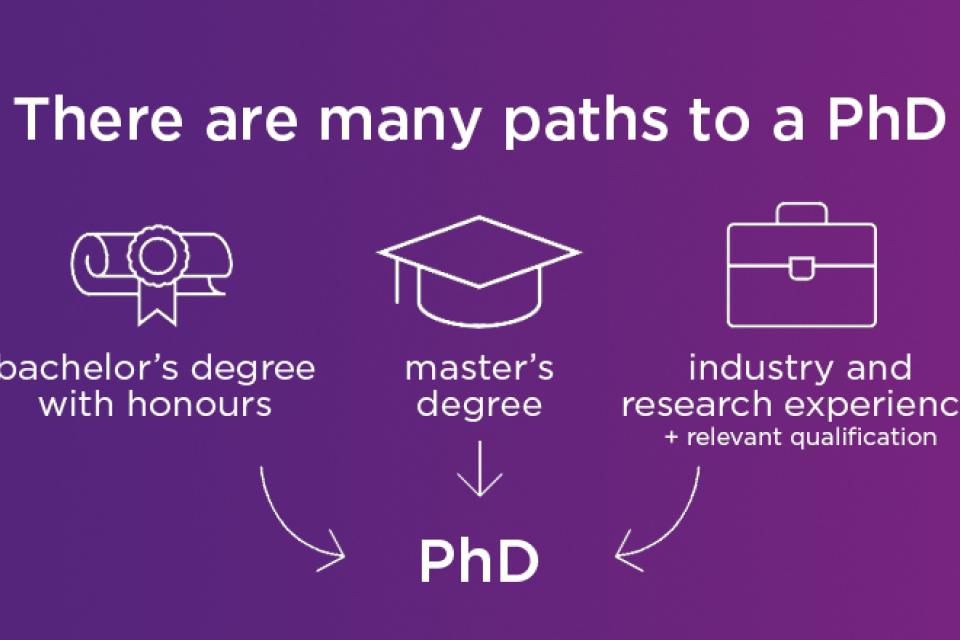
Do you need a master’s for a PhD?
As we said earlier, no – you don’t need a master’s to apply for a PhD. And if you're wondering more specifically ‘is an MPhil required for a PhD?’, the answer is also no. It may make logical sense at face value to complete a Master of Philosophy (MPhil) and then go on to study a Doctor of Philosophy, but in reality, it tends to work a bit differently.
All these types of postgraduate degrees and higher degrees by research can be a little confusing to keep track of, so let’s break it down into simpler terms.
So, here’s how some of the pathways through these degrees work.
- Some students decide to study and complete a Master of Philosophy, as it’s shorter than a PhD but still allows them to delve into a research project and produce a thesis (~40,000 words).
- Other students begin studying an MPhil then find they’d like to take their research further and apply to upgrade to a PhD program, adding a few more years onto their studies and producing an 80,000-word thesis.
- Many students aim big from the get-go and apply directly to a PhD program after having completed either a bachelor’s degree with honours or a master’s by coursework.
This is by no means an extensive list of ways in which you can order your studies; it’s just a few of the most common paths taken by university students interested in postgraduate studies and higher degrees by research.
The benefits of studying a master’s before a PhD
Now we’ve established that you can apply to study a Doctor of Philosophy without a master’s degree, let’s address the next big question: should you? Here are just a handful of the reasons why completing a master’s before moving onto a PhD is generally a good idea:
- It gives you a competitive edge compared to other applicants.
- It will provide you with a taste of what it’s like to conduct long-form research and reveal what it takes to be a good PhD student .
- You'll have a chance to explore a research topic to see if there’s enough scope to turn it into your PhD, or you may find offshoot topics that could be explored in more detail.
- You'll experience what it’s like to work with a supervisor and better understand if this process suits your personality type.
Can I go straight from bachelor’s to PhD?
Yes. Most universities will accept applications from students who have a bachelor’s degree with honours (typically at least IIA) as their highest level of completed study. Some universities may accept a bachelor’s degree without honours but with several years of relevant research experience, or a bachelor’s degree without honours but followed by a relevant graduate certificate or graduate diploma.
As we've emphasised above, there are definite benefits to completing further studies after your undergraduate degree to prepare you for your PhD. It’s understandable that you might want to fast-track your way to your Doctor of Philosophy, but remember that going in as prepared as possible will help you get the most out of your research.
If you don’t want to commit to a master’s program after your undergraduate degree but you still have your heart set on a PhD, talk to your course convener about fitting research units into your study plan during your bachelor’s program. Completing a graduate certificate or diploma following your bachelor’s, with a focus on the research area you wish to pursue with a PhD, will help you get a clearer idea of potential research topics too.
There are opportunities for undergraduate and postgraduate students to apply for one of UQ’s summer and winter research programs . These programs can help to boost your knowledge and skills in research and your field of study – and better prepare you for PhD studies.
When considering whether or not to apply for a PhD without a master’s degree, remember that the process is competitive, and it can take time to find the right supervisor . Having a master’s degree could put you ahead of other applicants and secure you that valued place as a PhD candidate.
Want to know more about how a PhD works? How do you find a supervisor? What are the best tips for writing your proposal? Find answers by reading our comprehensive guide: How to get a PhD.
Share this Facebook Twitter LinkedIn Email
Related stories

How long does a PhD take?
3-minute read
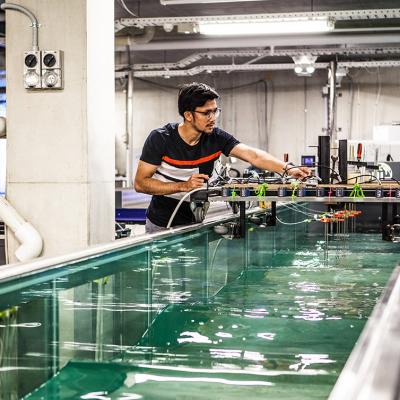
Can I do a PhD while working?
4-minute read

What makes a good PhD student?

How to get a PhD scholarship or funding

Research Voyage
Research Tips and Infromation
PhD without a Master’s Degree? Exploring Direct PhD Programs
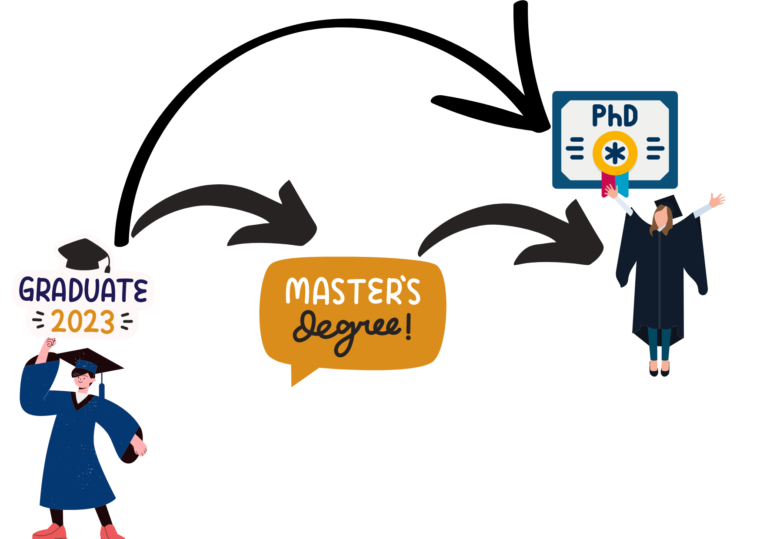
Introduction
What is a direct phd program.
- Pros of Doing a PhD Without a Master's Degree
- Cons of Doing a PhD Without a Master's Degree
- Fields in Which it is More Common to Enter a PhD Program Without a Master's Degree
- Fields in Which a Master's Degree is Often Required for Admission to a PhD Program
- How to Apply for a PhD Program Without a Master's Degree
- Examples of Successful PhD students who did not have a Master's Degree
- Top Universities Offering PhD without Master's Degree
Direct PhD Programmes in United States:
Direct phd programmes in europe:, direct phd programmes in australia:, direct phd programmes in asia:.
During my teaching years at a premier Engineering institute in India, I encountered an intriguing case that shed light on the possibility of pursuing a PhD without a master’s degree.
One day, a former student reached out to me with exciting news. She had successfully cleared the Graduate Aptitude Test in Engineering (GATE), a qualifying exam for admission to postgraduate programs. Even more surprising was her plan to directly join the PhD program at the prestigious Indian Institute of Technology (IIT) Delhi.
Initially, I found this puzzling—how could one step into a PhD without completing a master’s degree? It turned out that such programs do indeed exist at IITs and other esteemed institutions in India and abroad.
Intrigued by this revelation, I delved deeper into the details and later shared this valuable information with many students. Little did I know that this piece of knowledge would significantly benefit aspiring scholars aiming for a direct PhD path.
A PhD, or Doctor of Philosophy, is the highest level of academic degree that one can achieve in many fields. It typically involves several years of intensive research and coursework in a specialized area and completing a dissertation that makes an original contribution to the field. A PhD can lead to many career opportunities, including positions in academia, industry, and government.
The traditional path to a PhD usually involves completing a bachelor’s degree in a related field, followed by a master’s degree before starting the PhD program. The bachelor’s degree provides a broad foundation in the field, while the master’s degree provides more specialized training and research experience that prepares students for the rigours of a PhD program.
However, some students may wonder whether it is possible to skip the master’s degree and go straight into a PhD program. This can be an attractive option for students who want to save time and money, or who have extensive research experience that makes them well-prepared for a PhD program.
In this article, we will explore the pros and cons of doing a PhD without a master’s degree, as well as some examples of successful PhD students who took this route.
A direct PhD program, sometimes referred to as an integrated or combined PhD program, is a doctoral-level academic program that allows students to pursue a PhD degree without first obtaining a master’s degree.
In traditional PhD programs, students typically complete a master’s degree before embarking on their doctoral studies. However, in a direct PhD program, students are admitted directly into the PhD program after completing their undergraduate studies.
Direct PhD programs are often structured to be more streamlined, allowing students to move directly into advanced research and coursework related to their field of study. These programs are typically designed for highly motivated and academically strong students who demonstrate exceptional potential for research and scholarly work.
The specific structure and requirements of direct PhD programs can vary depending on the university and the field of study. In some cases, students may be required to complete additional coursework or examinations to ensure they have the necessary background knowledge and skills for doctoral-level research. However, the overall goal of these programs is to accelerate the process of earning a PhD by allowing students to begin their doctoral studies earlier in their academic career.
Pros and Cons of Doing a PhD Without a Master’s Degree
While it is possible to pursue a PhD without completing a master’s degree, there are several potential advantages and disadvantages to consider.
Pros of Doing a PhD Without a Master’s Degree
- Saving time and money: Completing a master’s degree can add two or more years to the time it takes to earn a PhD, as well as significant tuition costs. Skipping the master’s degree can allow students to complete their PhD more quickly and with fewer expenses.
- Gaining more research experience: Some students may already have extensive research experience, either through undergraduate research opportunities or work in a related field. Skipping the master’s degree can allow these students to continue building on their research skills and contribute to the field more quickly.
Cons of Doing a PhD Without a Master’s Degree
- Lack of preparation in research methodology and theory: Master’s degree programs often provide students with more specialized training in research methods and theoretical frameworks, which can be valuable preparation for a PhD program. Skipping the master’s degree can mean missing out on this preparation and potentially struggling to keep up with the demands of a PhD program.
- Potential challenges in meeting admission requirements: Some PhD programs may require applicants to have a master’s degree or equivalent research experience, which can make it difficult for students who have not completed a master’s degree to be accepted into a PhD program. Additionally, some students may need to complete additional coursework or exams to meet the admission requirements for a PhD program.
- A student who completed a bachelor’s degree in computer science and spent several years working in the industry as a software developer may have gained extensive research experience in a specialized area of computer science. This student may be well-prepared to pursue a PhD in computer science without completing a master’s degree.
- A student who completed a bachelor’s degree in psychology and has some research experience through undergraduate research opportunities may struggle to keep up with the demands of a PhD program in psychology without completing a master’s degree that provides more specialized training in research methods and theoretical frameworks.
Fields in Which it is More Common to Enter a PhD Program Without a Master’s Degree
While it is not uncommon for students to pursue a master’s degree before starting a PhD program, there are some fields where it is more common for students to enter a PhD program directly after completing a bachelor’s degree. These fields include:
- Engineering: In many engineering disciplines, it is common for students to enter PhD programs directly after completing a bachelor’s degree. This is because engineering programs often provide students with extensive research experience and specialized training in research methods and theoretical frameworks that prepare them for a PhD program.
- Natural Sciences: In fields such as biology, chemistry, and physics, it is also common for students to enter PhD programs directly after completing a bachelor’s degree. This is because these fields often require extensive research experience and specialized training in laboratory techniques and scientific methods, which students can gain through undergraduate research opportunities and coursework.
In these fields, students who have completed a bachelor’s degree and have extensive research experience may be well-prepared to pursue a PhD program without completing a master’s degree. However, it is important to note that this may not be the case in other fields, such as the social sciences or humanities, where a master’s degree may be more commonly required or preferred for admission to a PhD program.
It is important for students to research the admission requirements and expectations for PhD programs in their chosen field before deciding whether to pursue a master’s degree or apply directly to a PhD program after completing their bachelor’s degree.
Fields in Which a Master’s Degree is Often Required for Admission to a PhD Program
While it is possible to pursue a PhD without completing a master’s degree, there are some fields where a master’s degree is often required or preferred for admission to a PhD program. These fields include:
- Humanities: In fields such as history, philosophy, and literature, it is common for students to complete a master’s degree before applying to a PhD program. This is because these fields often require extensive coursework and training in research methods and theoretical frameworks, which students can gain through a master’s degree program.
- Social Sciences: In fields such as psychology, sociology, and political science, a master’s degree is often required or preferred for admission to a PhD program. This is because these fields often require specialized training in research methods and statistical analysis, which students can gain through a master’s degree program.
In these fields, students who have completed a bachelor’s degree but do not have a master’s degree may find it difficult to gain admission to a PhD program. This is because PhD programs in these fields often have high admission standards and may require applicants to have completed a master’s degree or equivalent research experience.
- A student who completed a bachelor’s degree in English literature and has some research experience through undergraduate research opportunities may need to complete a master’s degree in order to gain admission to a PhD program in literature. This is because PhD programs in literature often require extensive coursework and training in research methods and theoretical frameworks.
- A student who completed a bachelor’s degree in psychology and has some research experience through undergraduate research opportunities may be able to apply directly to a PhD program in psychology. However, some PhD programs in psychology may require applicants to have completed a master’s degree or equivalent research experience, which could make it difficult for this student to gain admission without completing a master’s degree.
How to Apply for a PhD Program Without a Master’s Degree
While it can be challenging to gain admission to a PhD program without a master’s degree, there are some steps that students can take to increase their chances of success. These steps may include:
- Demonstrating exceptional academic qualifications: Students who have completed a bachelor’s degree with exceptional grades and have a strong academic record may be more likely to be considered for admission to a PhD program without a master’s degree.
- Demonstrating research potential: Students with extensive research experiences, such as through undergraduate research opportunities or independent research projects, can demonstrate their potential for success in a PhD program.
- Completing additional coursework or exams: Some PhD programs may require applicants without a master’s degree to complete additional coursework or exams to demonstrate their readiness for PhD-level work. This may include completing additional courses in research methods, statistics, or theory, or taking qualifying exams to demonstrate mastery of the field.
- A student who completed a bachelor’s degree in physics with exceptional grades and extensive research experience may be able to gain admission to a PhD program in physics without completing a master’s degree. This is because the student has demonstrated exceptional academic qualifications and research potential.
- A student who completed a bachelor’s degree in history and has some research experience through undergraduate research opportunities may need to complete additional coursework or exams to gain admission to a PhD program in history. This is because PhD programs in history often require extensive coursework and training in research methods and theoretical frameworks, which students may not have gained through their undergraduate studies alone.
It is important for students to research the admission requirements and expectations for PhD programs in their chosen field before deciding whether to pursue a master’s degree or apply directly to a PhD program after completing their bachelor’s degree. Students may also want to reach out to professors and advisors in their field to discuss their options and receive guidance on the application process.
Please visit my article on “How to Build a Strong Research Portfolio in 07 Easy Steps” . This article will help you in building a strong research portfolio. Visit my blog post sections on writing research papers for journals and writing research papers for conferences . These articles will help you in writing quality papers for journals and conferences.
Examples of Successful PhD students who did not have a Master’s Degree
While it is less common for students to enter a PhD program without a master’s degree, there are examples of successful PhD students who have done so. These students have demonstrated exceptional academic qualifications, research potential, and perseverance in their programs. Some examples of successful PhD students who did not have a master’s degree include:
- Dr. Jennifer Doudna: Dr. Doudna is a biochemist who won the Nobel Prize in Chemistry in 2020 for her work on the CRISPR-Cas9 gene editing system. She entered a PhD program in biochemistry at Harvard University directly after completing her bachelor’s degree at Pomona College. She completed her PhD in just four years and went on to a successful career in academia and research.
- Dr. Maryam Mirzakhani: Dr. Mirzakhani was a mathematician who won the Fields Medal, often considered the highest honour in mathematics, in 2014. She completed her bachelor’s degree in mathematics in Iran and then entered a PhD program in mathematics at Harvard University without completing a master’s degree. She completed her PhD in just three years and went on to a successful career in academia and research.
- Dr. David Gelernter: Dr. Gelernter is a computer scientist and artist who completed his bachelor’s degree in mathematics and classical Hebrew literature at Yale University. He then entered a PhD program in computer science at the same institution without completing a master’s degree. He completed his PhD in three years and went on to a successful career in academia and research.
These examples demonstrate that it is possible for students to succeed in PhD programs without completing a master’s degree. However, it is important to note that these students had exceptional academic qualifications, research potential, and perseverance and that their success was not guaranteed.
Students who are considering applying to PhD programs without completing a master’s degree should carefully consider their own academic qualifications and research potential and should seek guidance and support from advisors and mentors in their field.
Top Universities Offering PhD without Master’s Degree
While it is less common for universities to offer PhD programs without a master’s degree, there are some prestigious institutions around the world that do accept students into PhD programs without a master’s degree in certain fields. Here are some examples:
- Harvard University, USA : Harvard’s Graduate School of Arts and Sciences allows exceptional students to apply directly to their PhD programs without a master’s degree in fields such as physics, chemistry, mathematics, and computer science.
- Stanford University, USA : Stanford’s School of Engineering offers a direct PhD program for exceptional students in fields such as electrical engineering, computer science, and mechanical engineering, without requiring a master’s degree.
- University of Cambridge, UK : The University of Cambridge’s PhD programs in sciences and engineering fields may admit students without a master’s degree on a case-by-case basis, considering their qualifications and research potential.
- Imperial College London, UK : Imperial College London’s PhD programs in engineering and physical sciences may admit students directly from a bachelor’s degree, based on their qualifications and potential for research.
- ETH Zurich, Switzerland: ETH Zurich, a leading institution in science and engineering, may admit students into their PhD programs without a master’s degree, considering their academic achievements and research potential.
- IIT Delhi, India : a leading institution in engineering, admit students into their PhD programs without a master’s degree, considering their academic achievements and research potential.
It’s important to note that the admission requirements and policies for PhD programs without a master’s degree can vary by institution and field of study and may be subject to change. It’s always recommended to thoroughly research and review the specific requirements of each institution and program you are interested in, and contact the admissions offices for up-to-date and accurate information.
Direct PhD Offered in Various Continents/Countries
- Massachusetts Institute of Technology (MIT)
- California Institute of Technology (Caltech)
- Stanford University
- Harvard University
- Princeton University
- University of Cambridge (UK)
- University College London (UK)
- ETH Zurich (Switzerland)
- Technical University of Munich (Germany)
- University of Amsterdam (Netherlands)
- Australian National University
- University of Melbourne
- University of Sydney
- University of Queensland
- Monash University
- National University of Singapore
- Tsinghua University (China)
- University of Tokyo (Japan)
- Seoul National University (South Korea)
- Indian Institutes of Technology (IITs) – Various campuses in India
These universities, among many others, offer direct PhD programs across a wide range of disciplines including engineering, natural sciences, social sciences, humanities, and more. It’s important to research each program carefully to understand its specific requirements, application process, and available funding opportunities.
Pursuing a PhD without a master’s degree is possible but it is less common and comes with its own set of challenges. In this article, we have discussed the pros and cons of doing a PhD without a master’s degree, fields in which it is more common to enter a PhD program without a master’s degree, and fields in which a master’s degree is often required for admission to a PhD program. We have also provided some advice on how to apply for a PhD program without a master’s degree and shared examples of successful PhD students who did not have a master’s degree.
For students who are considering pursuing a PhD without a master’s degree, it is important to carefully consider their academic qualifications and research potential. They should also seek guidance and support from advisors and mentors in their field, and consider completing additional coursework or exams to prepare for the rigors of a PhD program.
In conclusion, the decision to pursue a PhD without a master’s degree is a personal one and should be made after careful consideration of the individual’s goals, strengths, and weaknesses. We encourage readers to engage with the topic further by researching specific PhD programs and seeking advice from mentors and advisors in their field.
Upcoming Events
- Visit the Upcoming International Conferences at Exotic Travel Destinations with Travel Plan
- Visit for Research Internships Worldwide

Recent Posts
- Top 10 AI-Based Research Paper Abstract Generators
- EditPad Research Title Generator: Is It Helpful to Create a Title for Your Research?
- Are Postdoctoral Fellowships Taxable? A Guide to Understanding Tax Implications
- How to Get Off-Cycle Research/Academic Internships
- How to End Your Academic/Research Internship?
- All Blog Posts
- Research Career
- Research Conference
- Research Internship
- Research Journal
- Research Tools
- Uncategorized
- Research Conferences
- Research Journals
- Research Grants
- Internships
- Research Internships
- Email Templates
- Conferences
- Blog Partners
- Privacy Policy
Copyright © 2024 Research Voyage
Design by ThemesDNA.com

- Graduate School
Is it Possible to Get a PhD Without a Master’s Degree?
Featured Expert: Dr. Abha Sood, PhD
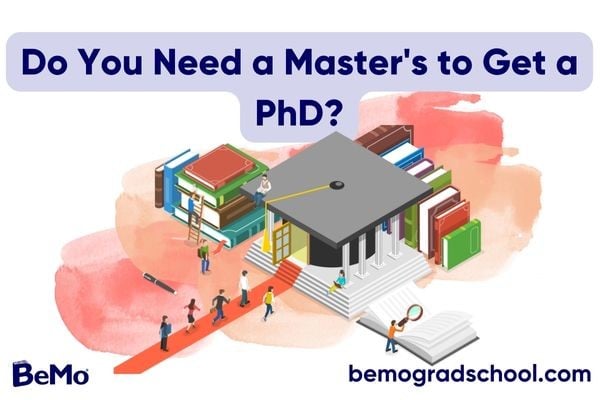
Do you need a master’s to a get a PhD? No! A master’s degree is not a universal requirement for all PhD programs, and there are some types of programs which waive the master’s degree. If you’re interested in how to get a PhD but you want to shorten the time it takes to graduate, you do have options. While they are not numerous, there are excellent, accredited PhD programs in almost every field which do not require a master’s degree. In this blog, learn how you can get a PhD without a master’s, what your program options are and what you need to do to get accepted.
>> Want us to help you get accepted? Schedule a free strategy call here . <<
Listen to the blog!
Article Contents 9 min read
Do you need a master’s to get a phd.
The short answer: No . It is possible to get a PhD without a master’s degree, as there are programs which accept applicants who have not completed a master’s degree first.
We’ll explore these in more detail below, but first we’ll look at whether a PhD is the right path for you and why you might want to skip the master’s.
If you’re weighing your options for graduate school and deciding between a master’s or PhD , you’re probably wondering which one is the best choice for you and how to complete your studies in the fastest way possible. If your end goal is a PhD, you might be looking at a very long educational commitment. How long does it take to get a PhD? On average, 4-7 years, and this timeline doesn’t include the time it takes to get a master’s degree, another 1 or 2 years.
Chances are, you’ve finished 4 years of an undergraduate degree or you’re still earning your bachelor’s degree and thinking ahead a few years. The idea of 5+ more years of schooling can be a little intimidating, so you may be wondering how to get a PhD without a master’s.
There are few different types of PhD programs that do not require a master’s degree first. Note that all of these programs DO require a complete bachelor’s degree to apply! We’ll explain what your options are for completing a PhD without a master’s below.
1. Direct Entry PhD Programs
Direct Entry PhD programs allow students with a Bachelor’s degree to apply directly for a PhD in their field, without first completing a master’s degree. They are typically 4-5 years long, so they are appealing for students who want to earn a graduate degree and shave a few years off their timeline to graduation. Many of the top colleges in the US and the universities in Canada offer these types of programs. However, these programs are far from the easiest PhD programs to get into ! They are quite competitive and require specific admission requirements you’ll need to meet in order to be considered.
2. Online PhD Programs
Online PhD programs are growing in both number and popularity. Online PhD programs offer students greater flexibility while also shortening the time it takes to get a PhD. Most online PhD programs are between 2 and 3 years, although there are 4-year programs and even 1-year online PhD programs out there. Depending on your area of study, an online PhD may not be an option, but there are fully accredited options out there. And, some online PhD programs don’t require a master’s degree.
Curious about whether a Master’s or PhD is right for you? Check out this video:
Direct Entry PhD Programs
Direct entry PhD programs can be a great option for students who want to jump straight from a bachelor’s degree to a PhD. This type of program is available in almost all disciplines, including business, computer science, education and nursing. These are also sometimes called accelerated PhD programs, designed to be 4-5 years and on your way to graduation sooner. As long as you meet all the admission requirements, you can apply to direct entry PhD programs without a master’s degree.
Universities with Direct Entry PhD Programs
Here are a few examples of top universities with direct entry PhD programs. This is not an exhaustive list, as there are many similar programs across the US and Canada!
Pros and Cons of Direct Entry PhD Programs
Since direct entry PhD programs accept students with a bachelor\u2019s degree only, the admission standards are naturally a little higher. Your academic record needs to be above average, and the minimum GPA to apply is usually 3.0 or even higher in some cases. On top of a stellar GPA, you also need to write the GRE, complete an application package and demonstrate you are ready for intense graduate level study without having completed a master\u2019s degree. ","label":"Cons","title":"Cons"}]" code="tab1" template="BlogArticle">
Admission Requirements for Direct Entry PhD Programs
Along with the usual PhD admission requirements, direct entry PhD programs may only admit students with only a bachelor’s degree if they demonstrate exceptional academic ability and extensive prior research experience. Here are some of the additional requirements you can expect for direct entry PhD programs:
- 4-year undergraduate degree (minimum GPA may be required)
- GRE (or GMAT, program-dependent)
- Research Experience
- Previous publications
- Excellent letters of recommendation
- Letter of Intent
- Research interest statement
- Grad school career goals statement
- Research Proposal
- Grad school interview
There are dozens of different online PhD programs out there, ranging from 1 to 4 years long. The length of time it takes to complete an online PhD program depends on the discipline. Online PhD programs are more common in fields like nursing, health sciences, business, education, criminology, engineering and computer science, though there are many more.
Many online PhD programs also have a hybrid learning option, where students can learn both online and in-person at the university. This gives you a little more flexibility and allows you to get the best of both worlds from an online PhD and a traditional one.
Online PhDs are also a good option if you want to do a PhD without dissertation or thesis, since a few of them don’t require it.
Universities with Online PhD Programs
Here’s a short list of universities that offer online PhD programs, but keep in mind there are many more out there.
Pros and Cons of Online PhD Programs
Lack of funding and networking : 100% online programs of course, lack the opportunities for in-person interaction and have fewer opportunities for professional networking in your field. There\u2019s also fewer funding options for online PhDs, if the program is not fully funded. ","label":"Cons","title":"Cons"}]" code="tab2" template="BlogArticle">
Admission Requirements for Online PhD Programs
Online PhD programs, or hybrid programs, will have the same admission requirements as most graduate school programs. On top of these, you will typically need a GPA of 3.0 and above, and you may need to complete specific prerequisite coursework.
The specific admission requirements will vary a little by program, but in general there won’t be anything unexpected.
If you’re thinking of applying to a PhD without a master’s degree, there are pros and cons to this decision. You may be wondering if not having a master’s degree will hurt your chances of getting accepted to a PhD program, or if it affects your chances of finding a job after graduate school.
While you can certainly choose to skip the master’s and still achieve your career goals with a PhD only, you should carefully consider your decision before you start applying to be sure it’s the right path for you.
Before you dive into PhD applications, consider the following things:
1. A PhD might not be necessary
Earning a PhD might not actually be necessary or especially helpful to achieving your career goals. A PhD is a research-focused, academic pursuit, so if your aim is to transition from academia to industry or find an industry job after a PhD , you might benefit more from earning years of work experience rather than years of education. There is always a possibility to pursue a PhD after a few years of working in your field if you change your mind.
In other cases, a master’s degree might give you the better mix of education and skill to achieve your career goals. And, a master’s degree is shorter and less expensive than a PhD, not to mention less competitive to get into.
On the other hand, if you are a true academic and want to find a job in academia , fast-tracking your PhD is a good way to do so!
2. A Master’s degree can give you a competitive edge
Having a master’s degree can actually give you a competitive edge for getting into some PhD programs. For example, even a direct entry PhD program that considers exceptional undergraduate students might give preference to a student with a full master’s degree if there is limited space in a program. Not to mention, not all PhD programs accept you without a master’s degree, and the ones that don’t require one will be more challenging to get into.
Completing your master’s first can also give you better and more funding opportunities for your PhD, if your program is not fully funded, since some scholarships and loans are only open to current graduate students.
3. A PhD is a huge commitment
Getting your PhD is a huge commitment of both your time and money, so you need to be certain it is the right choice for you before you put in the effort of applying and completing a program. Jumping from a bachelor’s right into an advanced graduate program is a big shift in the level of academic rigor and expectations, and not every student will be prepared for it.
Undergraduate students normally will not have the research experience or professional skillset that you would develop throughout the course of a master’s program. So the adjustment to a PhD program may prove to be too big a gap.
A master’s program is a sort of test-drive for graduate school study, introducing you to a higher level of education, research and learning. It’s also shorter and less expensive. So, you may not lose a much from changing your mind and dropping out of a master’s program as you will dropping out of a PhD.
Keep in mind that if you want to pursue advanced study in a new field or change jobs after working as an undergraduate, it will be difficult to find a PhD program that will accept you without a master’s degree.
Do you need a master’s to get a PhD? No, it is not strictly necessary. However, there are some advantages to earning your master’s degree first, and the path from bachelor’s straight to PhD is a little more challenging.
For those who are willing to commit and put in the hard work, the benefits of fast-tracking your PhD are definitely worth it, but you should carefully explore all your options and be sure of what requirements you need to meet first.
No. It is possible to get a PhD without a master’s degree. Some PhD programs accept exceptional students with a bachelor’s degree or allow you to earn a master’s and PhD in a combined, accelerated program.
While it is possible to skip your master’s and go straight to a PhD, you should consider what the options are, what the admission requirements are and whether graduate school is the right choice for you. Earning a PhD is a big commitment, so you need to be sure it’s a worthy pursuit!
Yes, direct entry PhD programs are highly competitive and the admission standards are usually quite high. These types of programs usually accept exceptional students who stand out from the crowd.
The shortest PhD programs are 1-year online degrees. While there are not many available, it is possible to earn a PhD in select fields, completely online, in around 12 to 18-months.
Traditional PhDs take between 4-8 years to complete. Direct entry PhD programs are usually 4-5 years, and online or hybrid PhDs can be between 2-3 years.
Yes, there are dual degree programs that allow you to earn a master’s alongside a PhD, shortening the traditional timeline and saving a bit on tuition costs.
A master’s degree is a graduate program that focuses on teaching you practical, career-related skills and knowledge. It’s designed for you to learn more advanced skills in your field so you can potentially increase your earnings in the workforce and pursue higher-level positions. A PhD is a heavily research-focused graduate degree. PhD students contribute new knowledge to their field through critical research and writing.
It can be tough to decide whether to stop at a master’s degree or go forward and pursue a PhD. The decision will come down to your personal choice, the requirements for your chosen career or position, your budget, timeline, and whether you feel you can and want to commit to extensive graduate studies.
Want more free tips? Subscribe to our channels for more free and useful content!
Apple Podcasts
Like our blog? Write for us ! >>
Have a question ask our admissions experts below and we'll answer your questions, get started now.
Talk to one of our admissions experts
Our site uses cookies. By using our website, you agree with our cookie policy .
FREE Training Webinar:
How to make your grad school application stand out, (and avoid the top 5 mistakes that get most rejected).
Time Sensitive. Limited Spots Available:
We guarantee you'll get into grad school or you don't pay.
Swipe up to see a great offer!

- DMCA Removal
- Privacy Policy
- Terms of Use
How to Find the Right PhD Programs Without Master’s

Do you need an outstanding website just like this? Get Started
Find cheap flights, cheap hotels, visa guides, and travel tips. Click Here
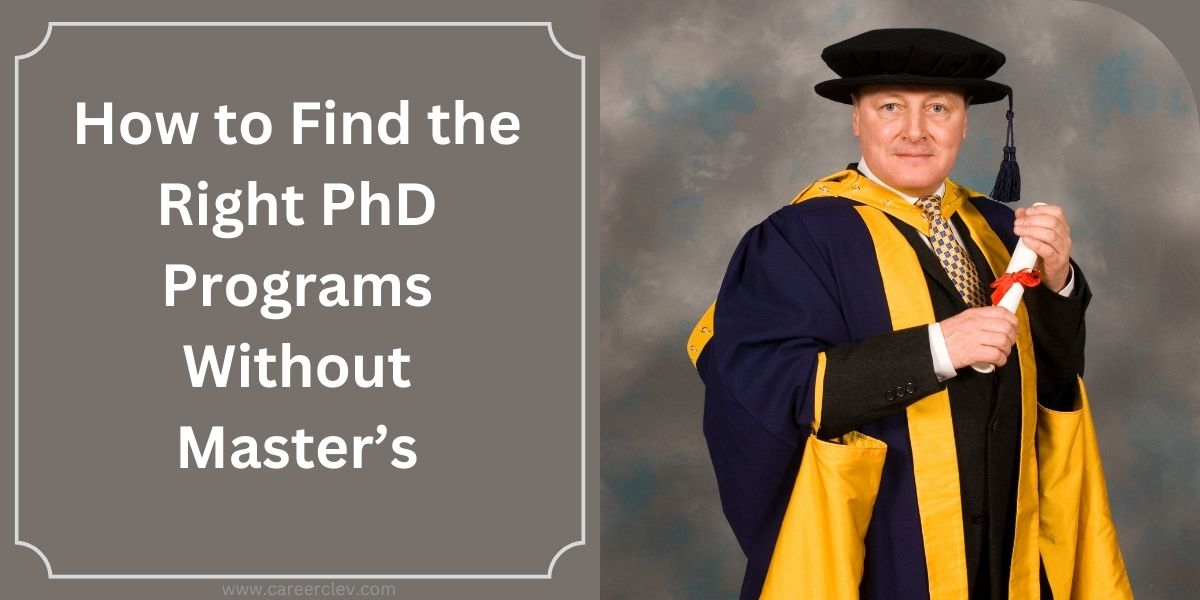
Ordinarily, you will have to obtain a master’s degree first before you can pursue a PhD program. This is because a master’s degree is a prerequisite for a doctoral degree program. However, you can skip this process to get into PhD programs without a master’s. Yes, you can do that; it is very possible.
I know this may sound a little bit strange. In fact, as a result, people keep wondering if they can actually skip from a bachelor’s degree to a PhD.
Well, the answer is yes; you can actually transition to a PhD from the bachelor’s degree level, but it is not easy.
This article will explain in detail how you can get into PhD programs without a master’s and answer every question related to PhD programs without a master’s.
In addition to this, you will learn about the advantages and disadvantages of pursuing Ph.D. programs without having to acquire a master’s degree.
Is it Possible to Get a PhD Without a Master’s?
Of course, it is very possible for anyone to acquire a PhD without undergoing a master’s degree program.
The usual pathway involves students studying to acquire bachelor’s and master’s degrees before enrolling to pursue a PhD Nevertheless, they can decide to skip the graduate level in order to acquire a doctoral degree.
In some countries, like the U.K., it is very common to do this.
While some countries still require a master’s degree before applying to a PhD program, many universities around the world do not.
But before you can do this, you will have to consider a lot of factors.
See Also: Best Universities for Masters in Communication
Factors to Consider While Going from a Bachelor’s to PhD
Before choosing to switch from a bachelor’s to a PhD, there are certain factors that you must consider first. These factors include:
- Master’s degree programs make you stand out
- Flexibility
- A Master’s degree could promote a Ph.D. program
How do I apply for PhD programs without a master’s?
Before you apply for PhD programs without a master’s, ensure that you check if you meet the requirements of the universities to which you’re applying.
Almost every institution has different rules and regulations for making Ph.D. applications because some may require a master’s degree during the application process.
Additionally, you should make sure that you have enough evidence in your application stating why you are fit to enroll in the doctoral program by submitting visible samples of your work , which is equivalent to a master’s degree thesis.
You will also have to show that you have the motivation and willingness to contribute your quota to the institution through innovation, research, collaboration, and hard work.
Which universities offer PhD programs without Masters?
Unfortunately, there is no list of universities offering PhD programs without a master’s. This is because every university has different requirements for its doctoral degree programs .
So, make sure you check the requirements of the institution and the PhD program that you wish to apply to.
Related: What is Advanced Degree: Q and A
If you’re able to find a university that does not require a master’s, ensure to make your application stand out because you will be up against other applicants who may hold a master’s degree.
You can also include a letter of recommendation with your application, and the letter should come from a respected university professor in the field to which you are applying.
Advantages and Disadvantages of PhD Program Without Master’s
Choosing to skip a master’s degree for a Ph.D. comes with a lot of advantages and disadvantages. You can see them below.
Advantage s
Bypassing a master’s degree program for a Ph.D. helps students save money and time. Doing this will help you eliminate between one and two years of expenses during the course of the program.
Read: Top Cheapest Online Law School To Study
Choosing to pursue Ph.D. programs without a master’s will make projects available to you. Once you find a project that you like, someone else might take it up while you are studying to acquire a master’s degree.
But by bypassing a master’s degree, you will have the opportunity to take up that research project during your doctoral program.
Disadvantages
If you don’t have a master’s degree, it could be a hindrance to you while applying for a Ph.D. program because other students who are seeking doctoral degree admission with you may have a master’s degree.
With this, they stand a better chance of securing admission than you.
Related: List of Top MSc Colleges in the World
The dissertation project that students undergoing a master’s degree program carry out gives them knowledge of how to handle a research project. Under the PhD program, chances are that you will choose a dissertation project for yourself.
So, if you skip the master’s degree, you will not have the opportunity to acquire the knowledge that this dissertation project offers.
Additionally, the dissertation project under the master’s degree program will enable you to work in collaboration with a project supervisor in the field. Also, see if you Can I do MBA after MS .
This will help you understand the relationship between a PhD student and the supervisor and decide the approach that best works for you.
With this understanding, you can now choose a supervisor who will help you find a nice PhD project. But If you bypass a master’s degree for a PhD, you will definitely miss out on this.
Finding the perfect PhD program without a master’s degree can be difficult, but it is certainly doable. Here’s a step-by-step guide to help you get through this:
1. Clarify Your Research Interests
Before you start looking for programs, establish a list of your research interests.
What field of study do you find most interesting? What specific research questions would you like to investigate? Knowing this will allow you to narrow down your choices.
2. Check Admission Requirements
Examine the requirements for admission to PhD programs at various universities.
While many programs favor applicants with a master’s degree, applicants with a solid bachelor’s degree and related research experience may be considered.
3. Identify Universities and Programs
Begin by investigating universities and programs that are relevant to your study interests. Look for universities that are well-known for their research in your field of interest.

4. Reach Out to Potential Advisors
Contact professors or researchers whose work you respect and who could be possible PhD supervisors. Inquire about PhD possibilities and express your interest in their research.
It is critical to establish a good relationship with a potential advisor.
5. Highlight Relevant Experience
Highlight any relevant research experience, articles, or projects you worked on throughout your bachelor’s degree in your application.
This can show your dedication and capacity to manage PhD-level research.
6. Prepare a Strong Statement of Purpose
Write a convincing statement of intent that explains why you want to pursue a PhD, your research interests, and why you’re a good candidate even if you don’t have a master’s degree.
Emphasize your enthusiasm, motivation, and any unique experiences or skills.
7. Prepare for Standardized Tests
GRE or other standardized test scores are required for many PhD programs. Prepare for these exams and go for high marks to boost your application .
8. Secure Strong Recommendation Letters
Request letters of recommendation from academics or professionals who can speak to your academic abilities and research potential.
9. Apply to Multiple Programs
Apply to a variety of programs, including ones that accept applicants who do not have a master’s degree. To increase your chances of acceptance, cast a wide net.
10. Consider Part-Time or Online Programs
Some universities offer part-time or online PhD programs with more flexible entry requirements . If you are unable to commit to a full-time, on-campus program, these options can be extremely beneficial.
11. Be Persistent
Be prepared for rejection, and don’t give up. It may be more difficult to gain admission to PhD programs without a master’s degree, but it is not impossible.
Continue to improve your application and apply to multiple programs until you are successful.
12. Seek Funding Opportunities
Look for scholarships, grants, and fellowships to assist with funding your PhD education. Financial assistance can make you a more appealing prospect.
13. Consider Bridge Programs
Some universities provide bridge programs to help students shift from a bachelor’s degree to a PhD.
Additional coursework and research experience are often provided in these programs to prepare you for PhD studies.
14. Network and Attend Conferences
Attend industry conferences and seminars to network with professors and researchers. Making connections can help you find opportunities and the right program.
List of PhD Programs Without Masters
While many PhD programs require applicants to have a master’s degree, other Ph.D. programs admit students with a bachelor’s degree immediately.
These PhD programs are frequently referred to as “direct entry” or “combined” programs. Consider the following options:
1. Integrated PhD Programs
Some colleges provide integrated PhD programs, which allow students to begin a PhD program immediately after finishing their bachelor’s degree.
These programs are often longer in duration than regular Ph.D. programs and may incorporate master’s-level coursework as part of the program.
2. PhD Programs with Conditional Acceptance
In some situations, universities may conditionally admit students with a bachelor’s degree.
This means that students are admitted into the Ph.D. program but may be required to complete additional coursework or achieve certain academic standards during their Ph.D. studies.
3. Research Experience
If you did a lot of research as an undergraduate, you might be able to use that experience to get into a Ph.D. program. In such circumstances, strong letters of recommendation and a well-defined research plan can be critical.
4. Professional Experience
Professional experience and accomplishments may be deemed equivalent to a master’s degree in certain professions, particularly the sciences and engineering.
Some PhD schools may admit you without a master’s degree if you have a strong track record of research or job experience in your field.
5. Alternative Routes
Alternative routes to a PhD exist in some subjects and disciplines, such as apprenticeships or industry-specific programs. These routes may not necessitate a master’s degree.
Remember that admittance to PhD programs can be quite competitive, but perseverance and a well-prepared application can help you overcome the challenge of not having a master’s degree.
Make your application materials stand out by emphasizing your enthusiasm, research experience, and potential for success in your chosen profession.
Leave a Reply Cancel reply
Your email address will not be published. Required fields are marked *
Save my name, email, and website in this browser for the next time I comment.
Recent in Degrees

15 Best Online MBA Without Bachelor’s Degrees in 2024

Is Advertising a Good Major, What Can I do With It?

How to Write a Killer Master’s Graphic Design Personal Statement

Master’s Degree Interview – What to Expect and How to Prepare

What Can I Do with a Master’s in Economics? (Expert Answer)


The Savvy Scientist
Experiences of a London PhD student and beyond
Can You Get a PhD Without a Master’s?

If you’re currently studying for your bachelor’s degree and are interested in doing a PhD, you may be wondering: can you get a PhD without a master’s?
The Benefits of Doing a Master’s Degree Before a PhD
A master’s degree allows someone to gain additional skills, research experience and domain-specific knowledge. When a supervisor is looking for potential PhD students, amongst other things they want to see that a candidate has:
- Interest in the subject
- Research experience
- Subject knowledge
Suitability for a PhD does not always require a master’s . But it is a convenient way to provide evidence for your suitability and commitment to research.
Therefore from a supervisor’s perspective, a master’s can provide evidence of these attributes. Having a master’s gives a little more assurance for the supervisor that you’re prepared for the work involved with a PhD. But not having a master’s absolutely does not have to be a barrier!
Already carried out a long research project as part of your bachelor’s degree and want to do a PhD in an area you have knowledge in? You may be able to convince a supervisor that you’re already prepared.
A few less substantial reasons people sometimes consider doing a separate master’s are:
- If for any reason your performance during the bachelor’s degree wasn’t ideal, doing a separate master’s provides another qualification to be assessed against.
- If you’re transitioning to a different research area it is the obvious way to gain knowledge.
- A chance to experience another [potentially more prestigious*] university.
My experience: Early on in your undergraduate degree and interested in doing a PhD? I thoroughly recommend getting as much research experience as possible. Even if you don’t have the opportunity to undertake much research during your course, UROPs are a fantastic way to spend your summer. During my PhD I had help from a few UROP students. One of them has even co-authored a paper with me. I wish that I had done one as an undergraduate!
*I really dislike the idea of considering the prestige of a university and the associated meritocracy , but sadly there is no getting away from the fact that it boosts career prospects.
So Can You Get a PhD Without a Master’s?
If you’re starting to look at PhDs and don’t yet have a master’s, there are two things you can do to get an idea of whether or not you’re likely to need a master’s first:
Check Advertised PhDs
Looking at a PhD advert such as via FindAPhD.com? Check the listed candidate requirements on the advertisement.
Sometimes a master’s isn’t mentioned:

Sometimes doing a master’s is a suggested advantage:

Here is a post detailing how you can find available PhD projects .
Ask the Academic
The most definitive answer you’ll receive for whether you can get a PhD without a master’s will be by contacting supervisors directly.
Often as soon as you start a conversation with potential supervisors they’ll ask to look over a copy of your CV. There is nothing wrong with being bold and checking whether you’re currently qualified enough to stand a competitive chance of getting a PhD.
My experience: When I was considering PhDs I emailed an academic saying I was interested in applying for a project with them but was worried I didn’t have relevant experience. Within 24 hours he had replied saying “Unfortunately, I’m not confident that you’d be selected if you applied as other candidates who have expressed an interest in applying had more relevant experience” Although disappointing, it’s much better to find this out quickly so that you can move on. I already had a master’s but not in a relevant area. If I’d desperately wanted to pursue this research area an obvious means to transition across and gain experience would have been with a master’s.
My Observations
I don’t believe that there are strict guidelines stating that you have to have a master’s. As shown in the adverts above, it is oftenseen as an advantage but is rarely strictly necessary.
Of the people I worked with during my PhD, not everyone had done a master’s.
Most of the people who had a master’s did it as a 4-year integrated master’s. This is common in certain sciences and engineering, and is exactly what I did . However, several people had not done a master’s before starting their PhDs. Including the guy I sat next to for all of my own PhD at Imperial.
Getting a bachelor’s degree outside of the UK will typically take one or two years longer than in the UK. Therefore international students in particular may be able to evidence their experience without a master’s.
Fancy getting a master’s as well as a PhD? Read on to find out how you could get paid to do both!
Don’t Yet Have a Master’s? Consider CDTs!
What are cdts.
In the UK there are many Centres for Doctoral Training (CDTs, sometimes known as DTCs) and it is worth drawing your attention to them if you don’t already have a master’s degree. CDTs offer combined funded Master’s + PhD programmes. You’ll be part of the relatively rare breed getting paid to do a master’s!
These centres are funded via the research councils and provide training for students around a certain theme. FindAPhD.com has a nice post which includes links to funded CDT projects . CDTs cover a huge range of themes. For example just within AI research there are 16 CDTs all for different themes:

The idea is that students from different backgrounds can get training and become proficient at helping to solve problems around the central theme of the CDT. In the first year you’ll have a mix of lectures and smaller projects to get a taste of different research topics. During the first year you’ll also choose your PhD topic. You will then spend three years working on that project before submitting your thesis.
Pros and Cons of CDTs
The advantages are:
- You’re part of a cohort so will likely have a greater sense of community and support versus a typical PhD project
- You get training and will learn new skills before deciding on a PhD project
- If you know you want to work in a certain research area but don’t yet know exactly what project you want to work on yet
- You get both a PhD and a master’s at the end, all of which is funded!
Potential disadvantages I can think of for doing a PhD through a CDT are:
- Taking a year longer than a normal PhD if you already know what you want to work on
- Your PhD position with a certain supervisor isn’t definite before you start. I’ve anecdotally heard of issues where many of the students in the cohort want to work with the same supervisor and of course not all of them can. On the flipside the flexibility in supervisors is an advantage for many.
How much do students earn doing a master’s and PhD through a CDT? Funding for students at CDTs is covered here . UKRI, the body that funds all nine UK research councils , has some case studies of CDT-PhD students which you can find on the various research council websites.
When looking for PhDs, I applied to two CDTs. If I hadn’t already been happy with my offer to study for my specific project at Imperial I’d have loved to have done one. I think they’re a great idea. Particularly if you are transitioning to a research area which differs from the subject of your bachelor’s degree.
Finding Suitable CDTs
As well as using a search engine, you can search for CDTs on FindAPhD.com by selecting PhD Research Programme and then choosing from the list:

Interested in Applying for a PhD?
Hopefully this post shows that you don’t need to be too put off applying for PhDs if you don’t have a master’s. Many people are successful in their PhD application without a master’s if they got research experience during their bachelor’s degree. And if you do fancy getting a master’s and PhD now you know that studying in a CDT could be a great option.
Interested in applying for a PhD? Here is my post covering the PhD applications process. It includes all the steps to apply and tips from successful PhD applicants:
How to apply for a PhD
If you’d like personalised help with your PhD application I am now starting to offer a small number of one-to-one sessions. Please contact me to find out more or click here to book a call.
So can you get a PhD without a master’s? Quite possibly, but a master’s could benefit your application.
Have you got other PhD questions you want answered? Please let me know!
If you’ve found this post useful you can subscribe here to stay notified of new posts:
Share this:
- Click to share on Facebook (Opens in new window)
- Click to share on LinkedIn (Opens in new window)
- Click to share on Twitter (Opens in new window)
- Click to share on Reddit (Opens in new window)
Related Posts

PhD Salary UK: How Much Do PhD Students Get Paid Compared to Graduates?
5th February 2024 5th February 2024

The Benefits of Having a PhD
7th September 2022 30th January 2024

My top PhD regrets: 10 lessons learned by a PhD grad
21st April 2022 25th September 2023
Leave a Reply Cancel reply
Your email address will not be published. Required fields are marked *
Notify me of follow-up comments by email.
This site uses Akismet to reduce spam. Learn how your comment data is processed .
Privacy Overview

- Majors & Careers
- Online Grad School
- Preparing For Grad School
- Student Life
Do You Need a Master’s to Get a PhD? Not Necessarily

If you’re thinking about becoming an expert in your field by getting a PhD, you might already know how long the road ahead of you may be. Many people dream of getting a PhD, but they often get put off by the time commitment and cost involved before they can even get started.
After all, PhDs can take anywhere from 3 to 8 years to finish — and in some cases, even more. Getting a PhD can be quite a difficult endeavor for people who have jobs , families, and other financial responsibilities to balance along the way.
If you want that coveted PhD without compromising your other responsibilities, you might find yourself asking, “do you need a master’s to get a PhD?”
The short answer is: not necessarily .
Although the traditional route to a PhD often involves getting a master’s degree first, many direct to PhD programs allow academics to skip an MA altogether. Even those with bachelor’s degrees have a decent chance at getting into a PhD program. However, going directly for a doctorate still has its advantages and disadvantages.
Table of Contents
How to Get a PhD Without a Master’s Degree
The minimum requirement to be considered for a PhD is a bachelor’s degree, but your chances of getting accepted will depend on how well you tender your application .
Educational institutions won’t freely advertise that they offer doctorates without master’s degrees. It becomes your task to look into the core beliefs of the universities you’re interested in to see whether you have a chance at success.
When putting together your application, you’ll have to check the universities’ requirements to ensure that your previous academic performance qualifies. The better your qualifications and recommendation letters are, the higher your chances of being considered.
Of course, you may be able to eliminate many of your troubles by going the direct to PhD route, which takes you from undergrad straight into a doctorate program.
PhD Without a Master’s – How Does it Work?
PhD programs that consider candidates who don’t already have a master’s will expect you to have at least a bachelor’s degree.
The expectation can vary depending on the doctorate, but the bare minimum requirement is generally:
A three-year undergraduate degree in a related discipline for STEM PhDs
A relevant four-year undergraduate degree for PhDs in the arts and humanities.
To be considered for a PhD without a master’s, you’ll also need to have a strong academic record from your undergraduate studies. Universities are highly selective when admitting PhD candidates without master’s, so you’ll need to show academic transcripts with a high GPA.
The first way you can study a PhD without a master’s is by applying to a program that allows a direct route from bachelor’s to PhD. There are a number of doctoral programs, especially online ones, that only require you to have an undergraduate degree to apply. Be aware that even if a master’s is not required, you’ll need to submit a strong application, including a compelling research proposal, in order to stand out from other applicants, many of whom may have master’s degrees.
Even if the program normally requires a master’s as a prerequisite, you may be able to get around this by first pursuing an MPhil. Under this process, you’re given a year to prepare a thesis, which outlines your initial research and how you plan to expand on it for a full PhD dissertation. If successful, your MPhil will be upgraded to a doctorate, you’ll become a PhD candidate, and eventually be able to earn a PhD. If you don’t demonstrate strong enough research skills, you may also pass and be awarded an MPhil degree, but won’t be upgraded to a PhD student.
Another option would be to pursue an integrated PhD program, sometimes known as an integrated master’s degree. These are specific courses offered by some colleges that combine a master’s and PhD: if you’re successful, at the end of the course you’ll be awarded both qualifications. Typically, integrated PhD programs last for four years, covering a one-year master’s and a three-year PhD.
How Long Does it Take to Get a PhD Without a Master’s?
Studying a PhD program without a master’s will typically add an extra year to the usual timeline , as you’ll need to spend an additional year either completing an MPhil or as part of an integrated PhD program. Therefore, as most doctorates take three to five years to complete, a PhD without a master’s will usually take between four and six years.
On the other hand, if you choose a PhD program that only requires a bachelor’s degree to join, it will only take the standard length of time for that program, usually three to five years.
Which Universities Offer PhDs Without a Master’s?
Unfortunately, most universities don’t advertise PhD programs without master’s, as candidates are generally accepted on a case-by-case basis. Furthermore, admission requirements for PhD programs are usually set by the school or department, so even if one PhD program accepts candidates without master’s degrees, this may not be the case across the university.
If you want to pursue a PhD without a master’s, you’ll need to contact the admissions committee of the programs you’re interested in, and check their requirements.
Is it Possible to Get a PhD Without a Bachelor’s Degree?
It is not impossible to get a PhD without first having a bachelor’s degree, but it is very uncommon. In some rare cases, universities may accept candidates for doctoral programs with extensive professional experience in lieu of an undergraduate qualification.
If you’re able to demonstrate significant contributions to your field through either work or self-directed study, and that you’ve directly contributed new knowledge to the discipline, you may be accepted into a PhD program. You’ll be more likely to be accepted if you’ve been published, preferably multiple times, and have a number of professional accreditations.
Advantages of Going Straight to PhD
The biggest advantage of bypassing a master’s degree is easily the amount of time and money you can save in the process.
An MA can take as short as a year or as long as three to obtain. And when doctorates usually take anywhere from 5-7 years, shaving 1-3 years off can make a huge difference — especially for busy people who want to get ahead in their careers quickly.
Of course, you also won’t need to pay thousands of dollars in tuition fees for an MA. These savings alone are usually enough to convince many people to go for a PhD without master’s degrees slowing them down along the way.
Other benefits you may encounter are:
- Grants and Stipends – Another advantage of joining a direct-entry doctorate program is the possibility of obtaining outside funding (if you qualify). Many PhD programs offer students financial assistance in the form of partial funding or full tuition waivers. If you can benefit from financial aid, you might be glad to know that some programs also offer stipends on top of the tuition grants.
- Research Projects – As a doctoral candidate, you might want to start or join certain research projects that may be time-sensitive. In cases like these, it’s usually advisable to go directly for PhDs to increase your chances of securing your dream project. If the project you’re looking at is a long-term endeavor, a doctoral program may also be the best route to allow for more in-depth fieldwork and experiments during your studies.
- Less Stress and Hassle – Choosing not to go for a master’s degree might help eliminate stress and hassle, such as school applications and potential relocations. Going direct to PhD means you’ll likely only need to move once (if at all) to your chosen school’s area.
Disadvantages of Skipping a Master’s Degree
Although the answer to the question “can you get a PhD without a master’s?” is a resounding yes, it doesn’t always mean that it’s the right choice for everyone.
Going from undergraduate studies straight into a PhD program can be quite a huge adjustment. The program might suddenly expect you to get familiar with new techniques, work, and professional relationships — and fast!
This adjustment period may put you at a disadvantage compared to other doctorate candidates who have previously completed a master’s degree.
Other hindrances you might encounter are:
- Difficulty During Applications Process – PhD programs are competitive and often only take the best-qualified applicants. If you’re competing with other students who have master’s degrees, it may affect your chances of securing a spot. However, if you go for a direct to PhD program (undergraduate straight into PhD), it may be possible to avoid this problem.
- Less Experience in Research and Dissertation Work – A thesis or dissertation is a major requirement of completing a master’s degree. Skipping an MA means you’re missing out on all of the experience you’d otherwise get in research and fieldwork. You’ll also have less experience actually writing a dissertation.
- Less Time to Confirm Your Interests – Working on your master’s thesis will allow you to select a topic that interests you. You usually spend about a year working on your thesis, during which you can explore the topic further to confirm whether it’s really what you want to go into. By skipping the MA, you’re potentially giving up the chance to verify if the field truly interests you before you fully commit to it for the duration of your PhD. Going straight into a doctoral program may also mean that you miss out on the chance to choose your own topic and create your own research proposal.
- Missing the Opportunity to Work with a Thesis Supervisor – When doing a master’s degree, postgraduate students work with a thesis supervisor who provides guidance and advice for their projects. Going direct to PhD means you miss out on the experience of working with a supervisor and finding the right types of communication, schedules, and professional relationships for your needs. This means you’ll have to figure all of this out during your doctorate program, which can add to your stress.
So Can you Get a PhD Without a Master’s? Yes, But Not Always
You don’t necessarily need a master’s in order to pursue a PhD. Some PhD programs accept candidates with a bachelor’s degree only, or you may be able to get around a master’s prerequisite by signing up for a MPhil or an integrated PhD program.
The “ideal” doctorate program doesn’t come along often. If you find yourself faced with a choice between pursuing a master’s degree or trying to get into your dream doctoral program, you might want to skip the master’s degree altogether.
Although you may miss out on an MA qualification, often, a finished PhD supersedes the need for one anyway.
Getting a PhD without a master’s degree can be difficult, but it’s certainly not impossible! For more inspiration, take a look at our guides to the highest-paying PhD degrees and the best one-year online PhD programs .
Frequently Asked Questions
Can you skip a master’s and get a phd.
Yes, there are a few ways you may be able to get into a PhD program without completing a master’s first. You could opt for a PhD program that doesn’t require master’s as a prerequisite, or go for a MPhil or integrated PhD program. However, keep in mind that not all universities or programs allow you to apply for a PhD without a master’s.
Can I apply for a PhD after my bachelor’s?
In some cases, you can apply to a PhD program as soon as you’ve finished your undergraduate degree. Some doctoral programs accept candidates with a bachelor’s degree only, though you’ll probably need to have an excellent academic record and a strong research proposal.
Is a PhD better than a master’s?
PhD and master’s degrees are valuable in different ways, so it’s not really fair to say that a PhD is better than a master’s. Although a PhD is a more advanced degree, there are roles and professions that would prefer you to have a master’s rather than a PhD. Master’s programs usually have a more practical, real-world focus, which can be more useful for many roles in the business, non-profit, and government sectors. On the other hand, a PhD is strongly rooted in in-depth research, so prepares candidates to work in research and academia.

Lisa Marlin
Lisa is a full-time writer specializing in career advice, further education, and personal development. She works from all over the world, and when not writing you'll find her hiking, practicing yoga, or enjoying a glass of Malbec.
- Lisa Marlin https://blog.thegradcafe.com/author/lisa-marlin/ 12 Best Laptops for Computer Science Students
- Lisa Marlin https://blog.thegradcafe.com/author/lisa-marlin/ ACBSP Vs AACSB: Which Business Program Accreditations is Better?
- Lisa Marlin https://blog.thegradcafe.com/author/lisa-marlin/ BA vs BS: What You Need to Know [2024 Guide]
- Lisa Marlin https://blog.thegradcafe.com/author/lisa-marlin/ The 19 Best MBA Scholarships to Apply for [2024-2025]
How Long Does it Take to Get GRE Scores?
How many grad schools should i apply to in 2024-2024, related posts.

- 12 Best Laptops for Computer Science Students

- Is a Master’s Degree Worth It? [2024 Guide]

BA vs BS: What You Need to Know [2024 Guide]
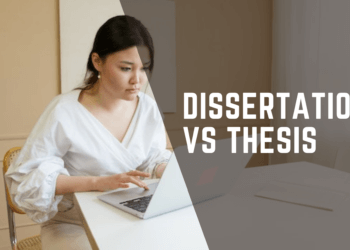
Dissertation vs Thesis: Your 2024 Guide

How To Apply to Grad School: Ultimate 2024 Guide

7 Best Laptops for Engineering Students in 2024

Leave a Reply Cancel reply
Your email address will not be published. Required fields are marked *
Save my name, email, and website in this browser for the next time I comment.
Recent Posts
- Grad Trends: Interest in Artificial Intelligence Surges
- Breaking Records: Yale Sees Most Selective Grad Admissions Season Yet
- Applying to Big Tech This Year? Here’s How to Ace It.

© 2023 TheGradCafe.com All rights reserved
- Partner With Us
- Results Search
- Submit Your Results
- Write For Us

- Skip to primary navigation
- Skip to main content
- Skip to primary sidebar
- Skip to secondary sidebar
- Skip to footer
career-advice.jobs.ac.uk
A PhD Without A Masters Degree

The PhD usually came after the Bachelor’s degree for many years in the United Kingdom. There was no real need to successfully gain a Master’s degree before embarking on this mammoth task of empirical research. Whilst some undergraduate degrees still lead to a Master’s qualification, and many people still complete Master degrees, it is possible to do a PhD without a Masters degree .
Firstly, your creative ideas are novel which allows for innovative, fresh approaches, in addition to exerted interest and enthusiasm for an area of study. Secondly, a Master’s degree can be quite expensive and although there are bursaries and schemes available they often still require costly personal financial contributions. Thirdly, pursuing a PhD without a Master’s degree reduces the amount of time on your studies, allowing you to follow a desired career path that motivates and excites you.
Disadvantages
The Master’s degree exists to show that the student can study at a higher level and this qualification allows you to practice the necessary research skills. This also determines if committing to a large research project is right for you. Additionally, the Master’s dissertation forms a part of the PhD in several British universities, so you are potentially gaining one to two extra years to make your original contribution to the field of study.
Applications
As with any PhD application , it is important to check your eligibility with the universities you have chosen to apply to. Different institutions have varying regulations, and in some cases, a Master’s degree might be compulsory. Also, make sure you have lots of evidence in your application about why you would make a good doctoral student by presenting concrete examples of your work at the equivalent of Master’s degree level. Additionally, be clear that you are motivated and determined to add to a body of knowledge through innovative, empirical research that requires stamina, hard work, determination and collaboration.
Coping strategies
The first few months can be overwhelming, but it is important to remember that you have been accepted as a doctoral student. This confirms that a panel of experts believe that you can achieve such a prestigious degree.
In your first term try and reread your research proposal once a week and review it critically. The nature of research is that it changes but it is also useful to remember what you proposed to do. Critical thinking is essential throughout the process.
Avail of the PhD support within the university. Regularly meet with supervisors and other doctoral researchers as support is necessary during this journey, especially in year one. Sign up to university workshops about PhD research – many run one-day skills sessions covering everything from communication to project managing. As a PhD student, you are part of a community of other doctoral researchers and this can be a great source of advice and wisdom, plus a great way of meeting new people.
In your first term, you should have regular and consistent supervision meetings. This allows your research team to set clear time goals and confirm milestones which you can work towards.
And remember, with consistent hard work, dedication, determination, collaboration and a critical mind, you will achieve your PhD .
Find your PhD here .
What is a PhD and Why Should YOU do one?
What did you think of our article? - please rate
Share this article
Dr Denise White FRSA
Dr Denise White FRSA is a multi-award-winning intellectual disability and music expert. Having over 25 years’ experience in the field of early years, primary, post-primary, special educational needs, further and higher education, Denise is known for her innovative and creative teaching methods that transforms lives. She is an advocate for inclusive and community-based ethical learning and teaching models.
She is a passionate education advocate with the talent to develop inspiring hands-on lessons that will capture a student’s imagination and breed success.
Known as ‘The Music Doctor’, Denise is an Author at Bookhub Publishing. Her Music Doctor Series will launch in March 2019. Denise is also a Speaker, Trainer, Consultant, Mentor and Researcher.
Web: www.themusicdoctor.co.uk
Twitter: @_TheMusicDoctor
Reader Interactions
You may also like:.
21st April 2020 at 11:04 am
To whom it concerns. During this enforced Covid Lockdown I explored the possibility of undertaking a Master’s in English Literature by distance learning. My Thesis has explored the topic of “Discrimination of Women in the Literature because of their gender”. As yet I am not affiliated with a University as my exploration is in earl. y stages. I have a Primary Honour’s Degree from my local University in Galway, Ireland. My query is can I bypass the Master’s and undertake a P.H.D in English Literature? I am familiar with the steps necessary to undertake the proposed course of study.
19th December 2020 at 6:03 pm
Good evening. Hope you are doing well inshaAllah. My wife wants to apply for a PHD program nearby london area. Do you have any suggestions on where to apply? She will need to apply for a student visa first in order to enrol into a graduate school. How can she apply for a student visa ? What type of governmental funding is available to her wife? My wife is a USA citizen and she already has her undergraduate degree from New York university. Plz advise me which university will be the best for my wife to enrol into a PhD program.
3rd March 2021 at 5:57 pm
I want to register fie for PHD, i only have law degree, i have no Masters degree
15th January 2022 at 3:30 pm
I want to apply for PhD. I have already have and degree and postgraduate diploma. Please advise
15th January 2022 at 3:32 pm
I have already a degree and a post graduate diploma
11th April 2022 at 10:13 am
Please advice to me where to start. I have degree in Public Administration and Political since graduated 2012 on South East European University in Skopje, in 2012 I make NARIC UK Recognized my foreign degree in UK comparable. In 2018 I have applied on South East European University Master in Business Administration and Management – Sub field Management. And I have finished all my exams on master degree but started this Pandemic Period with covid19 and I have no chance to make defend my master decertation in public defend. I am here in UK more then 10 years I am passion to study. I have EU Settled Status. I was in search for Integrated PhD ( Master and PhD ) in one. Because I have transcript but I don’t hold certificate in Master degree make me break this process. Please advice to me how to continue.
4th February 2023 at 6:47 pm
I am interested in completing a PhD, but only have a Social Science BA 2:1. Is this possible?
14th November 2023 at 2:38 pm
Firstly, you will have to improve your spelling and grammar before you apply for a PhD degree (even more so since you are a lawyer)!!!
Leave a Reply Cancel reply
Your email address will not be published. Required fields are marked *
Save my name, email, and website in this browser for the next time I comment.
Please enter an answer in digits: four × four =
This site uses Akismet to reduce spam. Learn how your comment data is processed .
Want to Get your Dissertation Accepted?
Discover how we've helped doctoral students complete their dissertations and advance their academic careers!
Join 200+ Graduated Students

Get Your Dissertation Accepted On Your Next Submission
Get customized coaching for:.
- Crafting your proposal,
- Collecting and analyzing your data, or
- Preparing your defense.
Trapped in dissertation revisions?
Do you need a master’s to get a phd, published by steve tippins on may 12, 2020 may 12, 2020.
Last Updated on: 3rd June 2022, 04:29 am
In the traditional academic model, at least in the United States, you get an undergraduate degree, followed by a master’s degree, and then finish your academic journey by getting a PhD. However, that isn’t the only way.
Do you need a master’s degree to get a PhD? The short answer is no; it is possible to get a PhD without a master’s (I did). However, there are some important caveats.
Do You Need a Master’s to Get a PhD? The History
The system of higher education in the United States evolved from the system established in the United Kingdom. Historically in the U.K., a student could get an undergraduate degree and then enroll in a PhD program — no masters degree needed.
In this situation, however, the PhD program was a little different than those found in the U.S. Students came into these programs with a research question or idea and spent their time developing the idea and performing the study under the guidance of a supervisor and a committee. There were very few required courses.
PhDs today remain focused on research (that’s how they differ from professional doctoral designations, like the Ed.D., the Psy.D., or the DBA). Now, though, doctoral programs provide an education in how to do research in the particular field as part of the matriculation process for the PhD, along with courses with program-relevant content for both the professional doctorate and research doctorate.
Today: Professional Master’s Programs

Do you need a master’s to get a PhD today? Not always.
In some disciplines, there are professional master’s programs that are considered terminal degrees. In business, the MBA is thought of as a terminal degree. In accounting, the MS in taxation is similar, as is an MFA for artists.
These degrees are designed for real-world, practical purposes. They are not meant to be a scaffold that provides the underpinning for a PhD.
So it is not unheard of in fields where there are professional master’s degree programs for students to enter a PhD program without a master’s degree.
How I Got a PhD Without a Master’s

In my case, I was about halfway through an MBA when it dawned on me that what I really wanted to do was teach and do research, so I applied for and switched into the PhD program.
(I told myself that I would eventually finish up the last three MBA classes. I never quite got there, because there was no real need or requirement to do so.) For me, this was one of the best decisions that I have ever made.
A recent modification in this area is the rise of the DBA – Doctorate in Business Administration. With the proliferation of the MBA degree, a demand arose for a degree that demonstrated knowledge and dedication beyond the MBA. This brought about the rise of the DBA program. Since a DBA is meant to imply something more than an MBA, most programs will require an MBA for entrance.
Within the field of business, it seems to depend upon which type of doctorate you are looking for. There is a path to a doctorate both with or without a master’s degree.
Should You Get a PhD Without a Master’s?

In most fields, the major distinction of the PhD is the research focus. A master’s in public health will prepare you to be, say, an administrator at a community not-for-profit. A PhD in public health will set you on a course of policy analysis or program evaluation.
It’s similar in most fields, and so what you’d be missing by going directly to the PhD would be the direct services focus that the master’s degree traditionally offers. It’s not just a matter of what you ultimately want to do, it’s a matter of knowing the ins and outs of the field from a service provider perspective.
Getting a PhD Without a Master’s: Humanities Programs
Do you need a master’s to get a PhD in the humanities fields? Here, students don’t have the same opportunities afforded by the professional degree programs.
In traditional liberal arts programs such as history, English, and sociology, the path to a PhD is traditionally through a master’s program. Schools design programs to fit together, so entering a PhD program without a master’s would leave a student at a significant disadvantage. Most social sciences programs would not accept a bachelor-level student into a PhD program without a lot of compelling reasons to do so.
Getting a PhD Without a Master’s: Social Sciences Programs

There are programs designed to go from the BS to the PhD, and one of these is psychology. Many universities admit bachelor-level students into their psychology doctoral programs, intentionally bringing their students through an entire course of study. So you don’t need a master’s degree to get a PhD in these programs.
Such an approach benefits the university by ensuring that the graduate education they receive is consistent; they teach everything from the ground up. That way, their students start from zero and grow together, all on the same page.
While this may sound exciting, the catch is that these programs usually take much longer than other PhD programs, in which students arrive with a master’s degree already in hand. Expect to spend a minimum of five years in such a program; often several more.
Getting a PhD Without Master’s: “Hard” Sciences Programs
Most programs in the hard sciences – disciplines such as chemistry, biology, and physics – require a master’s degree to get into a PhD program. These programs require great amounts of time in a lab, and the basis for lab work is developed in master’s programs.

Even if you could go directly to a PhD program from undergraduate school, most people who have completed programs say that you will get more from your degree if you enter having completed a masters program.
Pros and Cons of Getting a PhD Without a Master’s
As with most opportunities, there are pros and cons to getting a PhD without a master’s degree. Here is a general summary:
Pros of Getting a PhD Without a Master’s
- Less time in school could mean less cost
- You may be able to get to your ultimate profession faster
- Work on your research agenda could begin sooner
Cons of Getting a PhD Without a Master’s
- You will may not have the breadth of understanding needed for graduate work when you initially enter the PhD program
- You may realize in a Master’s program that another direction is better for you, and you will save time and money by switching before you get the terminal degree.
- It may be harder to find faculty members who are ready to mentor you if they suspect you don’t have the expertise in writing or research you would have gained in a master’s program.
Do You Need a Master’s to Get a PhD? Summary

Depending upon your discipline, getting a doctoral degree without a master’s degree is possible.
Before you move forward searching for doctoral programs that do not require a master’s, recognize that there is usually no way around a lot of hard work. Here are some questions to consider as you decide which way to go:
- Do you already have experience in research and writing, even without a master’s degree?
- Are you going into a field that has a tradition of taking students from BS to PhD?
- Is the school you’re interested in open to applicants who do not have a master’s degree?
- Are you prepared to explain (maybe many times) why you chose to skip the master’s degree?
- Are you prone to feelings of inadequacy or “ imposter syndrome ” that will be exacerbated by having less education than your peers in the program?
- What is your ultimate goal? Would a master’s degree get you working in the field quicker and give you experience that might serve you in your doctoral research?
- If you want a job at a university or in a particular field after completing your doctorate, how will your curriculum vitae compare to someone who does have a master’s degree in the field?
- How certain are you that this is the field for you? Might a master’s degree help you decide, before you commit to the rigors of a PhD program?
Most of all, the important thing to know is that getting a PhD is not easy. There are aspects of the research doctorate, particularly the dissertation, that make it a much higher hurdle than the master’s degree. Many people (about half in the U.S.) who begin PhDs drop out, often finishing all but their dissertation . That number is much lower for students in master’s degree programs.
Regardless of how you decide to move forward, you are ready to embark upon an exciting educational process. Good luck!
Steve Tippins
Steve Tippins, PhD, has thrived in academia for over thirty years. He continues to love teaching in addition to coaching recent PhD graduates as well as students writing their dissertations. Learn more about his dissertation coaching and career coaching services. Book a Free Consultation with Steve Tippins
Related Posts

Academic Career
Bipoc academics matter: diversity in academia is long overdue.
We at Beyond PhD Coaching firmly believe that diversifying academia is both necessary and important – and well past overdue. There’s no denying that higher education equals more power in society. This power has been Read more…

Academic Arrogance: Dismantling a Culture of Harm
Academics are like polar bears. We live alone; we hibernate. If you walk down the halls of academic offices, you’ll find that almost all of the doors are shut. We live a solitary existence, occasionally Read more…

How to Be a Good PhD Student
If you’re curious about how to be a good PhD student, this article is a good place to start. As a professor for over 30 years, much of that as a Dissertation Committee Chair, I’ve Read more…
Make This Your Last Round of Dissertation Revision.
Learn How to Get Your Dissertation Accepted .
Discover the 5-Step Process in this Free Webinar .
Almost there!
Please verify your email address by clicking the link in the email message we just sent to your address.
If you don't see the message within the next five minutes, be sure to check your spam folder :).
RIT graduate pursues Ph.D. across time zones

Nastaran Nagshineh, center, defended her Ph.D. thesis at RIT in April. Faculty from RIT’s Rochester and Dubai campuses served on her thesis committee and include, from left to right, Kathleen Lamkin-Kennard, Steven Weinstein, Nathaniel Barlow, and David Kofke (a professor at the University at Buffalo). Mohamed Samaha participated remotely and appears on the video screen behind the group and alongside Nagshineh’s picture.
Nastaran Nagshineh is one of the first Ph.D. candidates to bridge RIT’s Rochester and Dubai campuses. Her accomplishment creates a path for future students at the university’s international campuses.
Nagshineh completed her Ph.D. in mathematical modeling while working full time as a mathematics lecturer at RIT Dubai in the United Arab Emirates, teaching as many as five classes a semester. She described her Ph.D. journey as “an exercise in perseverance” due to competing demands and long days. Rochester is eight hours behind Dubai, and the time difference meant many late-night classes and meetings.
“I saw this collaboration as an opportunity, rather than as a challenge, because my primary adviser, Dr. Steven Weinstein (RIT professor of chemical engineering), and my co-adviser, Dr. Mohamed Samaha (RIT Dubai associate professor of mechanical engineering), both have the same area of research interest,” she said. “They both worked toward my success.”
Nagshineh is one of 67 RIT Ph.D. students who defended their thesis this academic year and who will earn their doctorate. RIT awarded 63 Ph.D. degrees in 2023.
In 2020-2021, RIT’s Graduate School met and surpassed the university’s goal of conferring 50 Ph.D. degrees during an academic year. That number will continue to grow as students cycle through the seven new Ph.D. programs that RIT has added since 2017, said Diane Slusarski , dean of RIT’s Graduate School.
Meeting these goals puts RIT on a path toward achieving an “R1,” or research-intensive designation, from the Carnegie Classification of Institutions of Higher Learning. RIT is currently ranked as an R2 institution . Many factors go into changing a university’s status, including research investment and maintaining a three-year average of 70 Ph.D. degrees awarded per year, according to Slusarski.
“We have met the goals of the strategic plan, and now we look forward to contributing to the research innovation in the future,” Slusarski said. “We want to help the new programs thrive and win national research awards.”
RIT’s emphasis on high-level research is seen in Nagshineh’s Ph.D. work. She applies mathematical modeling to the field of fluid dynamics. Her research has been published in top-tier journals and has gained notice, said Weinstein, her thesis adviser.
Weinstein describes Nagshineh’s accomplishments as “a testament to a fantastic work ethic and commitment” and is inspirational to younger students at Rochester and Dubai.
“The collaboration between RIT Dubai/Rochester has continued,” he said. “Another paper was submitted a few weeks ago with Mohamed Samaha and Nate Barlow (RIT associate professor in the School of Mathematics and Statistics) as co-authors, as well as Cade Reinberger, a younger Ph.D. student in my research group.”
Mathematical modeling is one of RIT’s newer Ph.D. degree programs, and Nagshineh is among its earliest graduates. The program has doubled in size since it began accepting students in 2017, Slusarski said. This past fall, the mathematical modeling program had 35 students, with two graduating this year.
Altogether, RIT has 13 Ph.D. degree programs currently enrolling 438 students, with computing and information sciences accounting for the largest with 117 students. RIT’s other Ph.D. programs include astrophysical sciences and technology , biomedical and chemical engineering , business administration , color science , electrical and computer engineering, imaging science , mechanical and industrial engineering , microsystems engineering , and sustainability .
New programs in cognitive science and physics will launch in the fall.
The growth in RIT graduate education—with more than 3,000 master’s and doctoral students—reflects a demographic change in the student population, Slusarski said. “We have a higher percentage of women in the graduate programs than we have for RIT undergraduate programs.”
RIT’s graduate programs enroll 42 percent women, according to Christie Leone , assistant dean for the Graduate School.
Nagshineh, who also holds an MS in electrical engineering from RIT Dubai, welcomes her role as a mentor to other women students on both campuses.
“As a young woman in an Arabic country, the power of women is often underestimated and undervalued, and I hope to serve as a role model to female students, especially those that question their path,” Nagshineh said.
She plans to continue in her career as a professor and a researcher. “I would like to pursue a research program where I can advise my own students and teach them more deeply.”
Recommended News
May 17, 2024

Top Teacher: Minnetonka sign language teacher Dr. Tracy Ivy
KMSP-TV selects Tracy Ivy '09 (secondary education for students who are deaf or hard of hearing) as a Top Teacher.
May 16, 2024
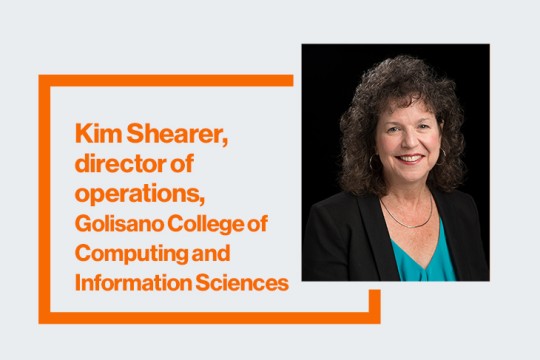
Kim Shearer’s passion for planning spans five decades at RIT
Kim Shearer's journey at RIT, marked by strategic planning and dedication, led to pivotal roles in shaping the university's computing college, spearheading expansions, fostering diversity, and leaving behind unique touches like binary code lights and cryptic messages within the campus architecture.
May 15, 2024

RIT student-faculty developed video game ‘That Damn Goat’ now available for purchase on Nintendo Switch console
A video game created by RIT students and faculty has reached a long-awaited milestone. That Damn Goat , developed and published through RIT’s MAGIC Spell Studios, is now available for purchase on the popular Nintendo Switch gaming console.

RIT researchers expect a rise in deepfake use in political campaigns
Spectrum News interviews Christopher Schwartz, research scientist in the Department of Cybersecurity, and Kelly Wu, computing and information sciences Ph.D. student, about generating and detecting artificial intelligence deepfakes.
Can you become a nutritionist without a degree? Here’s what you need to know

Nearly all Americans—9 out of 10—consume too much sodium, according to the CDC . Most of us also eat too much sugar and saturated fat—not to mention a lack of regular exercise. All of these factors contribute to a seemingly laundry list of potential health conditions, including diabetes, heart disease, and cancer.
If all of this worries you (and it should), then exploring a career in nutrition may be a path for you. Not only can you become an expert in food science and healthy habits, but more importantly, you get the opportunity to help others through goal setting and advice.

UNC Kenan-Flagler’s top-ranked online MBA
Over the next decade, the demand for nutritionists and dietetics is set to rise faster than the national average for all jobs, based on the U.S. Bureau of Labor Statistics data. Plus, the median pay is just shy of $70,000.
While the field of nutrition sounds like a promising space, it is one of the most complicated to understand from an educational perspective. It is true that largely, anyone can claim to be a nutritionist, but in order to give professional advice—especially in a clinic setting—individuals must receive proper certification. If you follow these four simplified steps, you can be well on your way to a career as a nutritionist:
1. Explore the subject
2. Know your state’s rules and requirements
3. Highly consider getting a degree
4. Engage in lifelong learning
Explore the subject
The best way to figure out if you truly enjoy the world of nutrition is to learn the day-to-day life of someone in the field.
As a result, it is a great practice to start watching YouTube videos or TikToks about the world of nutrition. If it fascinates you but you still aren’t entirely sold, explore nutritionist programs on education websites like Udemy or even enroll in a nutrition certification. Fortune has ranked the best nutritionist certifications to provide you with some of the best places to start that can provide a balance of having a thorough curriculum while also being affordable and flexible. However, it is important to keep in mind that these won’t propel you necessarily to a career just yet (keep reading below about state requirements).
During your exploration process, also begin thinking about where you would like to apply your nutrition skills—because it doesn’t have to just be in an office-like setting.
“Typically, nutrition professionals will be in a one on one setting, but there’s also many nutrition professionals that will study the science of nutrition and venture off into research or corporate wellness or any other of those sectors,” says Shaina Painter , MS, CNS, and nutritionist at Being Health.
Having a passion for scientific knowledge, in areas like nutrition science, biochemistry, and pathophysiology, will prove useful, Painter adds.
Know your state’s rules and requirements
Every single state has different guidelines when it comes to who can become a nutritionist and how; moreover each state may have different titles. Websites like nutritionED.org have plenty of resources that can help you find your states’ rules as well as advice for how to meet the requirements on a state-by-state basis.
Though, you still may want to conduct a Google search of your state’s nutritionist governing body—which may fall under the umbrella of a state’s department of labor or commerce—to find the most up-to-date requirements. The Academy of Nutrition and Dietetics and the American Nutrition Association are two of the largest organizations in the space and are partnered with many state entities.
For example, the state of Florida requires those wanting to become licensed in the field of dietetics and nutrition to have a bachelor’s degree in a field relating to human nutrition, food and nutrition, dietetics, or food management. Plus, individuals must have 900 hours of pre-professional supervised practice in dietetics and nutrition, along with passing the Commission on Dietetic Registration exam .
Other states, like Colorado and Arizona, have no regulations in the nutritionist space. However, it is important to keep in mind that certain jobs may require you to have industry-recognized certifications and licensures.
Highly consider getting a degree
Love it or hate it, but the most successful and experienced nutritionists are the ones with an educational backing. In most instances, a bachelor’s degree with a major focused in the world of nutrition is a baseline requirement. And in most states, an advanced degree—meaning a master’s or even doctorate—is required to meet licensure requirements.
Painter says having a master’s degree enables students to learn the standardized and structured information to succeed—which only provides safety to clients but also efficacy in making recommendations.
“If somebody has a medical condition, they really should be seeing a registered dietician who has the credential and the science background to help them,” explains Michelle Routhenstein , MS, RD, CDCES, CDN, owner of Entirely Nourished.
Even beyond state requirements, having an advanced degree can only help you in terms of having the expertise and skills to be providing professional medical advice. Nutrition is a serious business as different foods can have drastic effects on peoples’ bodies, so it should go without saying that you need to have the proper education with facts driving your assessments.
Luckily, finding a place to obtain a degree in nutrition isn’t too much of a complex task as hundreds of schools across the country have both bachelor’s and master’s programs—many of which are even offered through an online format. And since the process for becoming licensed can be complicated, having professors and peers who you can consult with is also an added perk.
Engage in lifelong learning
The way we ate 50 years ago is in many ways completely different from what we eat today, so nutrition is no exception to the idea that lifelong learning is of the utmost importance.
This is especially notable considering the amount of misinformation about proper nutrition. A study released earlier this year found that only 2% of nutrition content on TikTok was proven accurate based on regulated public health and nutrition guidelines.
As a result, constantly reading up on new studies, new types of popular food ingredients, as well as simple medical community research is important for a successful nutritionist. Your clients will likely bring you questions about new trends and popular foods, and you must be ready to bust any myths and/or explain how they can affect one’s body.
The takeaway
When considering a career as a nutritionist, one of the most important things to remember is that you will need years of education and professional training to not only have the appropriate expertise to provide nutrition recommendations to clients but also to be recognized by top employers. While this may sound daunting, the world of nutrition has many benefits, including simply being able to help other people improve their lives by what they consume—or not consume.
While it is a complicated educational space to follow, one of the best practices is to find yourself a mentor who may be able to explain the world based on their own experience. Above all, though, if you simply follow your state’s guidelines, you can be well on your way toward becoming an expert nutritionist.
Check out all of Fortune’ s rankings of degree programs , and learn more about specific career paths .

Harvard Business Analytics Program
Career path: nutritionist, best nutritionist certifications for 2024, want to become a nutrition coach by following these 4 steps, you can help others eat healthier, mba rankings.
- Best Online MBA Programs for 2024
- Best Online Master’s in Accounting Programs for 2024
- Best MBA Programs for 2024
- Best Executive MBA Programs for 2024
- Best Part-Time MBA Programs for 2024
- 25 Most Affordable Online MBAs for 2024
- Best Online Master’s in Business Analytics Programs for 2024
Information technology & data rankings
- Best Online Master’s in Data Science Programs for 2024
- Most Affordable Master’s in Data Science for 2024
- Best Master’s in Cybersecurity Degrees for 2024
- Best Online Master’s in Cybersecurity Degrees for 2024
- Best Online Master’s in Computer Science Degrees for 2024
- Best Master’s in Data Science Programs for 2024
- Most Affordable Online Master’s in Data Science Programs for 2024
- Most Affordable Online Master’s in Cybersecurity Degrees for 2024
Health rankings
- Best Online MSN Nurse Practitioner Programs for 2024
- Accredited Online Master’s of Social Work (MSW) Programs for 2024
- Best Online Master’s in Nursing (MSN) Programs for 2024
- Best Online Master’s in Public Health (MPH) Programs for 2024
- Most Affordable Online MSN Nurse Practitioner Programs for 2024
- Best Online Master’s in Psychology Programs for 2024
Leadership rankings
- Best Online Doctorate in Education (EdD) Programs for 2024
- Most Affordable Online Doctorate in Education (EdD) Programs for 2024
- Coding Bootcamps in New York for 2024
- Best Data Science and Analytics Bootcamps for 2024
- Best Cybersecurity Bootcamps for 2024
- Best UX/UI bootcamps for 2024
Boarding schools
- World’s Leading Boarding Schools for 2024
- Top Boarding School Advisors for 2024

IMAGES
VIDEO
COMMENTS
Without a Masters degree you will have limited (if any) experience of maintaining a supervisor relationship, conducting original research and writing up your findings - all important parts of doing a PhD. But it is important to remember that while it might initially feel overwhelming, that's not to say you won't catch up.
Saybrook University offers a PhD in Clinical Psychology program that is fully online. Students who do not hold a master's degree must complete 103 to 109 credits to graduate, while those who do have a master's in a related field must complete 100 to 106 credits. The program can typically be completed in 5 years.
To be considered for a PhD without a Master's, at a minimum you will be expected to have a Bachelors degree. For students looking to enrol onto a STEM (Science, Technology, Engineering and Maths) PhD, a relevant Bachelors in a 3-year undergraduate course is usually expected. However, this is not the case for students looking to apply to non ...
University of Illinois at Urbana-Champaign. University of Michigan - Ann Arbor. Yale University. While pursuing a PhD without a master's degree may seem like a daunting task, it can be a great option for those who are passionate about their field of study and want to dive deeper into research.
It's almost a sure pass to a doctoral programme. 3. A Master's is the only way to a PhD in a new field. It does not matter where you want to pursue a PhD, if you don't have the right academic background in a connected subject area, your chances of being accepted to a PhD are little to zero. So, if you want to change careers and pursue a ...
Similarly, you can get a PhD in the Ohio State University's chemical engineering programme without having done a master's. Across the pond, the University of Cambridge can accept students without a master's degree, where they'll be placed in a probationary year before progressing into their dissertation. As you can see, various routes ...
Yes, it is possible to get a Ph.D. without having a Master's degree first. Conventionally, if you wanted to pursue a Ph.D., you would first get your Bachelor's degree, then your Master's degree, and then apply for a PhD. However, there are a few unconventional ways of getting a Ph.D. Firstly, you can opt to bypass your Master's degree ...
Yes, it is possible to earn a PhD without a master's degree. Though the traditional path entails completing a master's program before embarking on a doctorate, some schools and programs offer options to skip the master's entirely. Actually, in select cases, it's the preferred approach. Below, we'll share four common scenarios that can ...
No, a master's degree is not always required to earn a PhD. A number of schools may allow you to enroll in a PhD-level program without having previously obtained your master's degree if you meet the school's and program's admission criteria. In some cases, Ph.D. programs may allow you to skip the need to obtain a master's degree.
It's possible to get into a PhD program with a graduate diploma (and no bachelor's or master's degree), but you'll need extensive documentation proving former research experience to support your application - plus a decent GPA. This type of application is assessed on a case-by-case basis by some universities and can be extremely ...
Yes. Fields where you can get a Ph.D. without a master's include clinical psychology and government. These and other programs combine the master's and Ph.D. curricula. Not all universities or academic departments let you earn a Ph.D. without a master's degree. However, they may let you apply if you hold a master's in a different field.
A direct PhD program, sometimes referred to as an integrated or combined PhD program, is a doctoral-level academic program that allows students to pursue a PhD degree without first obtaining a master's degree. In traditional PhD programs, students typically complete a master's degree before embarking on their doctoral studies.
PhD programs without masters degree programs exist and often save candidates plenty of time, effort, and money. Pursuing a master's degree first is the usual path, but many people choose to chart their own path by applying to PhD programs without masters degree.
Direct Entry PhD programs allow students with a Bachelor's degree to apply directly for a PhD in their field, without first completing a master's degree. They are typically 4-5 years long, so they are appealing for students who want to earn a graduate degree and shave a few years off their timeline to graduation.
6. Prepare a Strong Statement of Purpose. Write a convincing statement of intent that explains why you want to pursue a PhD, your research interests, and why you're a good candidate even if you don't have a master's degree. Emphasize your enthusiasm, motivation, and any unique experiences or skills.
Although some people may be unaware of this, it's possible to enrol in a Ph.D. course without completing a master's degree first. Traditionally, it was possible to obtain a Ph.D. right after completing a bachelor's degree. Some undergraduate courses automatically lead to a postgraduate course, but it's still possible to skip the master's degree ...
The most definitive answer you'll receive for whether you can get a PhD without a master's will be by contacting supervisors directly. Often as soon as you start a conversation with potential supervisors they'll ask to look over a copy of your CV. There is nothing wrong with being bold and checking whether you're currently qualified ...
Studying a PhD program without a master's will typically add an extra year to the usual timeline, as you'll need to spend an additional year either completing an MPhil or as part of an integrated PhD program. Therefore, as most doctorates take three to five years to complete, a PhD without a master's will usually take between four and six ...
The PhD usually came after the Bachelor's degree for many years in the United Kingdom. There was no real need to successfully gain a Master's degree before embarking on this mammoth task of empirical research. Whilst some undergraduate degrees still lead to a Master's qualification, and many people still complete Master degrees, it is possible to do a PhD without a Masters degree.
Importantly, you don't need a master's degree to apply for the Psy.D. program. In fact, most of the students enrolled in Regent's Psy.D. in Clinical Psychology do not hold master's degrees. The admission requirement is a completed four-year bachelor's degree from a post-secondary institution with state and regional accreditation.
Getting a PhD Without Master's: "Hard" Sciences Programs. Most programs in the hard sciences - disciplines such as chemistry, biology, and physics - require a master's degree to get into a PhD program. These programs require great amounts of time in a lab, and the basis for lab work is developed in master's programs. ...
I have lived with glaucoma since birth. Growing up in Pakistan, with limited medical resources, I lost most of the sight from my right eye. As I pursued my academic training, including moving abroad for a master's and then a Ph.D., I managed with just one eye, and medication kept my overall condition stable.
College. Nearly Half of All Masters Degrees Aren't Worth Getting According to new research, 23 percent of bachelor's degree programs and 43 percent of master's degree programs have a negative ROI.
The online master's in emergency and disaster management from Georgetown University, located in Washington, D.C., offers a flexible schedule, allowing part-time students up to five years to ...
Indeed, what universities seem to have forgotten is that they have more than a bit of a say in how these forces play out. There is a vibrant and prosperous future for M.A. and Ph.D. education not in radical transformation but in reconciliation—reconciliation between academic and applied domains of knowledge production, and in enabling lives as researchers and scholars both within the academy ...
In 2020-2021, RIT's Graduate School met and surpassed the university's goal of conferring 50 Ph.D. degrees during an academic year. That number will continue to grow as students cycle through the seven new Ph.D. programs that RIT has added since 2017, said Diane Slusarski, dean of RIT's Graduate School.
Nearly all Americans—9 out of 10—consume too much sodium, according to the CDC. Most of us also eat too much sugar and saturated fat—not to mention a lack of regular exercise. All of these ...